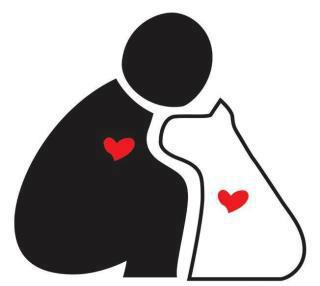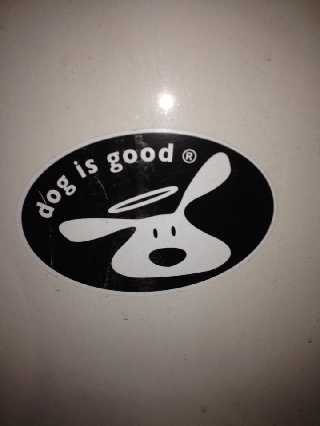

Ladies and gentlemen, cast off your tired old prejudices! It's time to quit picking on Poodles.
Long maligned as an affeminate dandy, the Poodle has been the butt of jokes for generations, probably ever since the first person put a fancy haircut on what had been a hard-working hunting dog. But the soul of the Poodle remains, under everything that's ever been done to that hair.
Oh, and there has been a lot done! The curly coat of the Poodle has been cut en every imaginable way, dyed in every imaginable color, and (less commonly) even left alone to work its way into floor-length cords that make the dog look, well, like a French Rastafarian. And as if all that humiliation weren't enough, Poodle lovers seem to share a higher-than-average desire to dress up their pooches -in all kinds of getups, from faux leopard-skin jackets and pearl collars to leather biker jackets with leashes to match.
But looks alone shouldn't define a dog, and that's surely true with the Poddle.
The Poodle is a smart dog, one of the smartest by any measure you care to use. Poodles learn quickly and love to show off what they know. They make novice trainers look expert, and expert trainers look brilliant. And they make fools out of the poor owners who don't realiza just how smart a dog they have.
The Poodle is a friendly dog. Poodles have an innate sense of cheerful superiority and a firm belief that everyone should be entitled to the pleasure of their company. They are the consummate companion.
The Poodle is a hard-working dog. A handful of Poodle lovers are trying hard to restore the breed to its working heritage. Podles excel in all manner of canine competitions -obedience and agility most naturally, but a few are even showing up in the hunting circles. Poodles as sled dogs? That, too, has happened. They love to have a job to do.
But most of all, the Poodle is a dog with great sense of humor, which you must admit is important to a breed that's been through all that this one has. Poodles will laugh at you, but they are really happier to laugh with you, genial souls that they are. And they even seem able to laugh at themselves.
A few years back, I was at the Westminster Kennel Club dog show, standing next to a big Poodle who was waiting to go into the ring for Best in Show competition. The poor fellow's fanny had been shaved in a way no living thing should have to endure, and I'm sure his sperm count fell with every draft. And yet, as the dog and I briefly made eye contact, he cracked his mouth in a happy smile, shook his well-coiffed head -and winked.
As I stood there in gape-mouthed shock -wondering, did I really see that?- the dog turned and went into the ring with his handler, Poodle pride in every high step.
How could you not love a dog like that?
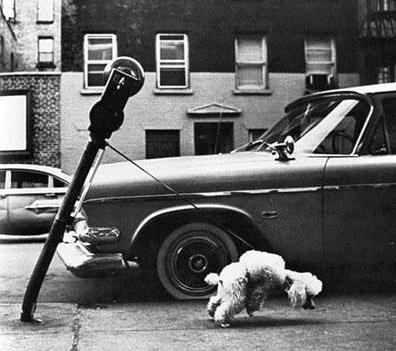
The way I see it, dogs had this big meeting, oh, maybe 20,000 years ago. A huge meeting -an international convention with delegates from everywhere. And that's when they decided that humans were the up-and-coming species and dogs were going to throw their lot in with them. The decision was obviously not unanimous. The wolves and dingoes walked out in protest.
Cats had an even more negative reaction. When they heard the news, they called their own meeting -in Paris, of course- to denounce canine subservience to the human hyperpower. (Their manifesto -La Condition Feline- can still be found in provincial bookstores.)
Cats, it must be said, have not done badly. Using guile and seduction, they managed to get humans to feed them, thus preserving their superciliousness without going hungry. A neat trick. Dogs, being guileless, signed and delivered. It was the beginning of a beautiful friendship.
I must admit that I've been slow to warm to dogs. I grew up in a non-pet-friendly home. Dogs do not figure prominently in Jewish-immigrant households. My father was not very high on pets. He wasn't hostile. He just saw them as superfluous, an encumbrance. When the Cossacks are chasing you around Europe, you need to travel light. (This, by the way, is why Europe produced far more Jewish violinists than pianists. Try packing a piano.)
My parents did allow a hint of zoological indulgence. I had a pet turtle. My brother had a parakeet. Both came to unfortunate ends. My turtle fell behind a radiator and was not discovered until too late. And the parakeet, God bless him, flew out a window once, never to be seen again. After such displays of stewardship, we dared not ask for a dog.
My introduction to the wonder of dogs came from my wife Robyn. She's Australian. And Australia, as lovingly recounted in Bill Bryson's In a Sunburned Country, has the craziest, wildest, deadliest, meanest animals on the planet. In a place where every spider and squid can take you down faster than a sucker-punched boxer, you cherish niceness in the animal kingdom. And they don't come nicer than dogs.
Robyn started us off slowly. She got us a border collie, Hugo, when our son was about 6. She knew that would appeal to me because the border collie is the smartest species on the planet. Hugo could 1) play outfield in our backyard baseball games, 2) do flawless front-door sentry duty, and 3) play psychic weatherman, announcing with a wail every coming thunderstorm.
When our son Daniel turned 10, he wanted a dog of his own. I was against it, using arguments borrowed from seminars on nuclear nonproliferation. It was hopeless. One giant "Please, Dad," and I caved completely. Robyn went out to Winchester, Va., found a litter of black Labs and brought home Chester. Chester is what psychiatrists mean when they talk about unconditional love. Unbridled is more like it. Come into our house, and he was so happy to see you, he would knock you over. (Deliverymen learned to leave things at the front door.)
In some respects -Ph.D. potential, for example- I don't make any great claims for Chester. When I would arrive home, I fully expected to find Hugo reading the newspaper. Not Chester. Chester would try to make his way through a narrow sliding door, find himself stuck halfway and then look at me with total and quite genuine puzzlement. I don't think he ever got to understand that the rear part of him was actually attached to the front.
But it was Chester, who dispensed affection as unreflectively as he breathed, who got me thinking about this long-ago pact between humans and dogs. Cat lovers and the pet averse will just roll their eyes at such dogophilia. I can't help it. Chester was always at your foot or your hand, waiting to be petted and stroked, played with and talked to. His beautiful blocky head, his wonderful overgrown puppy's body, his baritone bark filled every corner of house and heart.
Then last month, at the tender age of 8, he died quite suddenly. The long, slobbering, slothful decline we had been looking forward to was not to be. When told the news, a young friend who was a regular victim of Chester's lunging love-bombs said mournfully, "He was the sweetest creature I ever saw. He's the only dog I ever saw kiss a cat."
Some will protest that in a world with so much human suffering, it is something between eccentric and obscene to mourn a dog. I think not. After all, it is perfectly normal, indeed, deeply human to be moved when nature presents us with a vision of great beauty. Should we not be moved when it produces a vision -a creature- of the purest sweetness?
Time magazine, international edition. June 16, 2003

BRISTOL, Pa. - The family of a man who died last week said that when they went to a funeral home to make arrangements for him, they found one mourner already in attendance - a faithful dog.
Polo, a 3-year-old mix of German shepherd, chow chow and labrador, was often seen in the company of Ed Crossan, whose daughter, Donna, owns the dog. Crossan, 73, died after surgery last week.
On the day that Theresa Crossan was preparing to make funeral arrangements for her husband, someone let Polo out and no one could find him.
When the family arrived at the Wade Funeral Home about five blocks away, they found Polo pacing back and forth.
When Polo disappeared again the next day, Donna Crossan and her 10-year-old son, Brendon Lopez, knew just where to look.
"The first few times, we didn't see him," she said. "We decided to try one more time. Sure enough, when we drove into Wade's, Polo came running from the side of the house."
Brendon said he thinks Polo could smell his missing friend at the funeral home, and Dr. Eric Meihofer, a veterinarian, agrees.
"It was just a dog looking for his pal," he said. "It's an amazing story. It shows that the dog was very loyal and loving."
The Associated Press, January 14, 2004
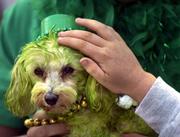
SAN CLEMENTE, Calif. (AP) - There's now a playground for old dogs with a little less wiggle in their wag. Mature pooches uninterested in learning new tricks now have their own hangout, a gerontologic dog park, to socialize.
The San Clemente Dog Park opened Wednesday, across the street from a frenetic canine playground for the young and restless.
The senior side opened six months after the main bark park. The city spent $275,000 on the entire complex and the San Clemente Dog Lovers organization plans to sell advertising banners that will hang on the perimeter chain-link fence to finance the park's maintenance.
For some 3,000 licensed dogs in the city, the park is the only chunk of city property that doesn't require a leash. But the older dogs don't seem too interested in any untethered running and roughhousing.
Fifteen-year-old Taz - that's 105 in dog years - is a mixed breed whose hip was broken in 10 places in a car accident about five years ago. She's been to the main dog park, but she stayed to the side, away from the other dogs.
``She can't see very well and she can't hear very well,'' Taz master Bill Thomas said. She probably won't be any more active in the senior park, but at least she won't have to worry about being knocked over by a rambunctious Rottweiler, Thomas said.
``Dogs are like kids. They like to roughhouse, but ask an 80-year-old if he likes to roughhouse. He may want to, but it's not the same anymore,'' said Gregg Lipanovich, who launched the San Clemente Dog Lovers campaign for senior canines.
Los Angeles Times, March 18,2004
SALEM, Ore. - For five years, Frances Jackson looked everywhere for her missing dog, Millie, who had run beneath a truck in 1999, then disappeared.
But in the end, it was a microchip that brought the black Labrador retriever home.
The dog had been fitted with a microchip that identified her as belonging to Jackson, and when she was picked up as a stray and taken to the Humane Society of the Willamette Valley, Jackson got the call.
"I was absolutely stunned,"' she said. "I went down to the shelter as fast as I could."
Jackson had tried just about everything to locate Millie, including a classified ad and an extended search of the area where she ran away. She even spent $100 for a tracking dog and its trainer, who were unable to pick up Millie's scent.
Now, the two are bonding all over again, the dog is getting used to the idea that she will get three meals each day, every day.
"Millie's getting used to being Millie," Jackson said. "And I'm getting used to having a dog again."
The Associated Press, March 29, 2004
WASHINGTON - As many a dog owner will attest, our furry friends are listening. Now, for the doubters, there is scientific proof they understand much of what they hear.
German researchers have found a border collie named Rico who understands more than 200 words and can learn new ones as quickly as many children.
Patti Strand, an American Kennel Club board member, called the report "good news for those of us who talk to our dogs."
"Like parents of toddlers, we learned long ago the importance of spelling key words like bath, pill or vet when speaking in front of our dogs," Strand said. "Thanks to the researchers who've proven that people who talk to their dogs are cutting-edge communicators, not just a bunch of eccentrics."
The researchers found that Rico knows the names of dozens of play toys and can find the one called for by his owner. That is a vocabulary size about the same as apes, dolphins and parrots trained to understand words, the researchers say.
Rico can even take the next step, figuring out what a new word means.
The researchers put several known toys in a room along with one that Rico had not seen before. From a different room, Rico's owner asked him to fetch a toy, using a name for the toy the dog had never heard.
The border collie, a breed known primarily for its herding ability, was able to go to the room with the toys and, seven times out of 10, bring back the one he had not seen before. The dog seemingly understood that because he knew the names of all the other toys, the new one must be the one with the unfamiliar name.
"Apparently he was able to link the novel word to the novel item based on exclusion learning, either because he knew that the familiar items already had names or because they were not novel," said the researchers, led by Julia Fischer of the Max Planck Institute for Evolutionary Anthropology in Leipzig.
A month later, he still remembered the name of that new toy three out of six times, even without having seen it since that first test. That is a rate the scientists said was equivalent to that of a 3-year-old.
Rico's learning ability may indicate that some parts of speech comprehension developed separately from human speech, the scientists said.
"You don't have to be able to talk to understand a lot," Fischer said. The team noted that dogs have evolved with humans and have been selected for their ability to respond to the communications of people.
Katrina Kelner, Science's deputy editor for life sciences, said "such fast, one-trial learning in dogs is remarkable. This ability suggests that the brain structures that support this kind of learning are not unique to humans and may have formed the evolutionary basis of some of the advanced language abilities of humans."
Perhaps, although Paul Bloom of Yale University urges caution.
"Children can understand words used in a range of contexts. Rico's understanding is manifested in his fetching behavior," Bloom writes in a commentary, also in Science.
Bloom calls for further experiments to answer several questions: Can Rico learn a word for something other than a small object to be fetched? Can he display knowledge of a word in some way other than fetching? Can he follow an instruction not to fetch something?
Fischer and her colleagues are still working with Rico to see if he can understand requests to put toys in boxes or to bring them to certain people.
Rico was born in December 1994 and lives with his owners. He was tested at home.
The Associated Press, June 10, 2004
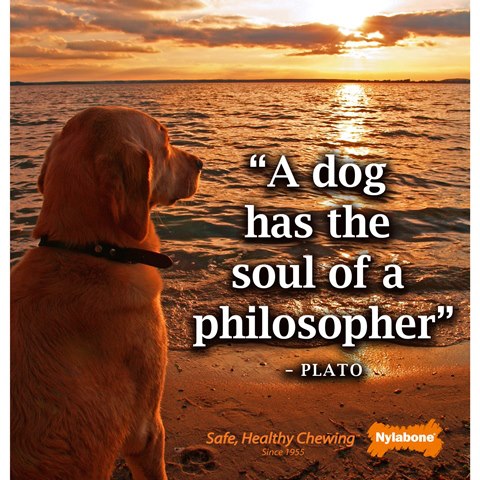
Camp Bow Wow, the nation's only franchised doggie day-care center, is much like a children's nursery where working parents drop off their tots. Pet owners leave their canines during the day or check them in for overnight stays. In climate-controlled facilities, they romp with toys, run on exercise machines, and swim in "paw pools." Overnight campers are given their own beds to curl up on, rather than kennel-style cages. "I wanted to have a comprehensive, safe, fun, place for dogs," says Heidi Flammang, Camp Bow Wow's founder and CEO.
For most owners, dogs have long been considered part of the family. But families today are spending more and more money keeping Fido happy, as an increasing number of goods and services become available for those on four legs: Pet therapists, designer doggie shampoo, and aromatherapy products, to name a few. Indeed, this penchant for pampering now feeds a $34 billion industry, up from just $17 billion in 1994, according to the American Pet Products Manufacturers Assn.
About 10 years ago, Flammang and her husband Bion channeled their love of dogs into a business plan for Camp Bow Wow. But when Bion was killed in a plane crash in 1994, Flammang, then a pharmaceutical sales rep, put her dreams on hold. She briefly switched careers, and in 1996 she became a certified financial planner. But her original dream kept nagging at her. "I'm an entrepreneur, and it was really my passion," she says.
Flammang distinguished her business from the start by providing an expanded menu of services. Unlike many facilities, Camp Bow Wow will care for older, sickly pets as well as puppies. Other features include on-site vaccinations and grooming care. And the strategically placed Webcams that ensure owners can check in on their "babies" anytime, from anywhere in the world, have become a hit. Prices run between $20 and $25 per day session and between $30 and $35 for overnight boarding.
Flammang sold her first franchise in August, 2003. Today Camp Bow Wow has 11 locations. By the end of 2005, Flammang plans to have 75 sites, from Florida to Indiana. In two years, she predicts, the count will be 150 centers across the country. "We're on target," she says.
Wendy Caldwell opened one of Camp Bow Wow's first franchises in Broomfield, Colo., in October, 2003. In fact, business is going so well that in March, Caldwell decided to sell her franchise and move to her native Calgary, where she'll head Camp Bow Wow's Canadian operations. She expects to open at least 15 franchises in the next two years. "I think there's really a need for a place for dogs to have fun instead of being left alone," she says. "Owners are more concerned with their dogs' mental and social welfare. And this is a much better alternative then leaving them in a cage."
BusinessWeek online, April 21, 2005
PEWEE VALLEY, Ky. - A woman who escaped a fire in her home was killed Thursday when she went back into the burning building to save her cat, authorities said.
Iris Kay Call, 42, went back inside the house after escaping the blaze with her husband. She did not reappear, and firefighters later removed her from the house, according to a police report.
Call died of smoke inhalation after being taken to a hospital, authorities said.
The cat she was trying to rescue died in the blaze.
The Associated Press, August 11, 2005
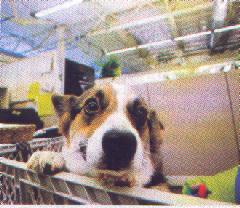
Googlers are permitted to bring their dogs (but not cats) to the workplace.
Time magazine, international edition. February 20, 2006
According to this national poll of working Americans 18 years of age and over, nearly one in five U.S. companies allows pets at work. And a majority of those polled believe there are benefits to having pets at work, such as relieving stress, improving relationships with co-workers, making for a happier workforce and creating a happier work environment.
But what about people who are allergic to dogs? Or are afraid of them after a childhood attack or bite? They're in the minority is what. According to the survey:
7 am - Oh boy! A walk! My favorite!
8 am - Oh boy! Dog food! My favorite!
9 am - Oh boy! The kids! My favorite!
Noon - Oh boy! The yard! My favorite!
2 pm - Oh boy! A car ride! My favorite!
3 pm - Oh boy! The kids! My favorite!
4 pm - Oh boy! Playing ball! My favorite!
6 pm - Oh boy! Welcome home Mom! My favorite!
7 pm - Oh boy! Welcome home Dad! My favorite!
8 pm - Oh boy! Dog food! My favorite!
9 pm - Oh boy! Tummy rubs on the couch! My favorite!
11 pm - Oh boy! Sleeping in my people's bed! My favorite!
Day 183 of my captivity.
My captors continued to taunt me with bizarre little dangling objects. They dine lavishly on fresh meat, while I am forced to eat dry cereal. The only thing that keeps me going is the hope of escape, and the mild satisfaction I get from clawing the furniture. Tomorrow I may eat another house plant.
Today my attempt to kill my captors by weaving around their feet while they were walking almost succeeded. Maybe I should try this at the top of the stairs.
In an attempt to disgust and repulse these vile oppressors, I once again induced myself to vomit on their favorite chair. I must try this on their bed.
Decapitated a mouse and brought them the headless body in an attempt to make them aware of what I am capable of, and to try to strike fear into their hearts. They only cooed and condescended about what a good little kitty cat I was. This is not working according to plan.
There was some sort of gathering of their accomplices. I was placed in solitary confinement throughout the event. However, I could hear the noise and smell the food. More important, I overheard that my confinement was due to my powers of inducing something called "allergies". Must learn what this is and how to use it to my advantage.
I am convinced the other captives are flunkies and maybe snitches. The dog is routinely released and seems more than happy to return. He is obviously a half-wit.
The bird, on the other hand, has got to be an informant. He speaks with them regularly, and I am certain he reports my every move. Due to his current placement in the metal room, his safety is assured. But I can wait.
It's only a matter of time.
Dog owners like Loke have been scrambling to hide their pets in the face of a new crackdown which allows only one dog per household and bans breeds taller than 14 inches. Fears have been fueled by graphic Internet pictures and witnesses who say police are beating to death strays and dogs that run afoul of regulations.
"I can't believe this is happening," said Loke, 33, who keeps the curtains in her first-floor apartment drawn to ward off prying neighbors and walks her dogs in an underground parking lot. "It's so stressful. In the morning, I hear dogs barking and people talking outside my home and I think the police are coming."
The pressure is so bad that Loke is returning to her native Hong Kong and closing a business she has had for two years.
In China, dogs have long been seen as a source of meat as much as companionship. But the current crackdown has touched a nerve in the rapidly modernizing capital, especially among its burgeoning middle class.
"What kind of rules are these? I don't expect everybody to love animals. But I do want to have my rights to keep pets," said Clare Xiao, an account manager at an advertising company. She sent her larger Brittany to a kennel run by a friend and kept her Pekinese, a stray she found on the street.
"What the government is doing is just disappointing, cold and emotionless," said Xiao.
Many of the prohibitions have been on the books since 2003, but only sporadically enforced. The city of 13 million people has 1 million dogs, half of them unregistered, according to state media.
Officials have extended the 2003 rules to cover not only Beijing's center but some outlying areas. The clampdown, announced Nov. 6, gave owners until Thursday to comply or the dogs would be seized and the owners fined.
One owner Zhu Qiao has moved three times since 2001 to find areas where her black-and-white dog, Gou Gou, could be raised safely and within the law.
"He's part of my life, he's my friend and family," said Zhu, 30, a television producer. "If you want to impose a law, you have to get the opinion of dog owners and experts. You can't just take them away."
"I can't move again. There's no option but to hide him and if he gets taken, I'll go with him."
Another owner had his Labrador retriever taken away Wednesday because she was too big.
"She is a very amicable dog. She never barked," said the owner, a businessman who would give only his surname Yang. "If they don't allow me to raise her here, I will find another place. I will get her back."
Witness accounts and photos on the Internet have shown dogs being captured in nets and pummeled with wooden and metal sticks. But authorities have vowed to carry out a "strict but civilized" campaign that police hoped would not anger dog owners, according to the official Xinhua News Agency.
"I have never heard of dogs being culled after they were caught by police. Dogs are a man's best friend and we treat them as friends, even when we have to lock them up for the sake of public security," Xinhua quoted a Ministry of Public Security official, Bao Suixian, as saying.
Many owners have sent their dogs to kennels outside the city. Some are handing them over to friends and family.
Joyce Wang gave one of her dogs to her sister and is keeping Ding Ding, her fox terrier, close by her side. She said she had heard that the government was offering $25 to people who reported on rule-breaking dog owners.
"I'm scared and worried. Now I don't take him outside during the day," Wang said. "Even in the evening, we will take a detour if we see people in the compound we live in."
The Associated Press, November 15, 2006
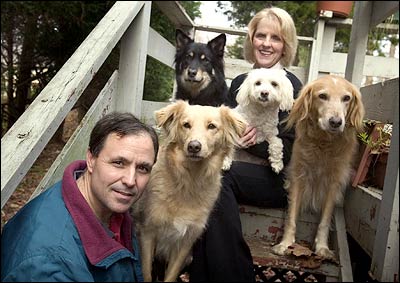
Their case is one of a growing number around the country that asks courts to recognize what dog owners already do: that man's best friend is worth more than its retail price.
"When you lose something like that, the loss is immeasurable," said Sarah Scheele, 47. "You can't just go to a pet store and buy another animal. It doesn't replace the family member that was lost."
Unable to have children, the Scheeles got two dogs instead. They fed them human food, brushed their teeth and put coats on them when it rained.
The Scheeles say the death of Shadow, a shepherd-chow-spaniel mix they called their "little boy," entitles them to damages beyond the direct expenses typically awarded in such cases.
Historically, courts have allowed people suing over the death of an animal to collect such expenses as its purchase price and veterinary bills.
"Courts look at market value, and I don't think that reflects society's values," said the couple's attorney, Heidi Groff.
The Scheeles' case began in July 2003, when they drove from their home in Annapolis, Md., to Vermont to watch his aunt and uncle renew their wedding vows. They planned to leave the dogs in their truck during the service.
They got to the church early, so they let the dogs loose, a violation of the leash law in Northfield, which is 10 miles south of Montpelier.
The dogs wandered into Lewis Dustin's yard. Dustin, 70, who had been squirrel hunting that day, had a combination BB and pellet gun at the ready.
According to the Scheeles, Shadow didn't menace Dustin. But Dustin fired a pellet at Shadow in hopes of scaring him off.
Instead, the shot penetrated the dog's chest and severed an aorta. Shadow died en route to a veterinarian's office.
Dustin later pleaded guilty to a misdemeanor charge of animal cruelty. He was given a year of probation and ordered to perform 100 hours of community service and pay $4,000 in restitution.
A judge ruled in the Scheeles' civil suit that there is no provision in Vermont law that would allow them to recover damages for the loss of Shadow's companionship or for emotional distress.
The couple plan to appeal to the state Supreme Court.
"What we're trying to do is expand the law to recognize that the companionship between a dog and its owner is such that the owner is entitled to compensation" when that relationship is destroyed, said David Putter, an attorney hired to help with the appeal.
Though the attorneys acknowledge it's a novel legal theory, noting that people can't sue for loss of companionship in the deaths of best friends or domestic partners, they want an exception for four-legged friends.
In recent years, trial courts in Florida, New York, Illinois, California, Oregon and Washington have carved out a category for pets that is somewhere between property and people.
An appeals court in Washington state last May created a new tort called "malicious injury to a pet," which allows someone to collect emotional distress damages. The case involved three teenagers who doused a cat with gasoline and lit it on fire. The cat was euthanized.
Animal law expert Geordie Duckler said appellate courts have lagged society at large in recognizing the relationship between a pet and its owner.
"As soon as some good appellate panel (of judges) recognizes this special relationship that people have had for a long time with their pets, I think it will be like the flip of a light switch," and the law nationwide will change, said Duckler, a Portland, Ore., lawyer.
For his part, Dustin believes the issue has been overblown.
"These people think that this dog is a human being," he said. "It's not a human being. And that dog was trespassing."
Dustin, 74, said he can't afford a lawyer and would take whatever comes as the litigation continues.
"If they want to put me in jail, that's what they can do," he said. "I'm not going to pay them anything because I don't owe them anything. All I'm going to do is go to court and go through the motions."
Sarah Scheele said she and her husband are pursing the case to honor Shadow.
"We're not in it for the money," she said. "We want to get national legislation that will recognize pets as companions and not just property."
The Associated Press, December 4, 2006
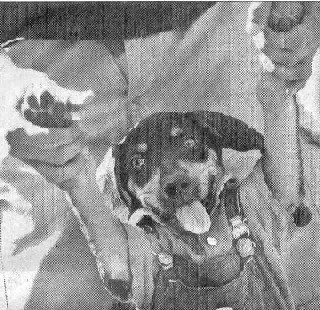
Seeing photos of the 22-year-old nuzzling a puppy from a newborn litter the night before his death in a roadside bombing in Iraq prompted Rollins' family and girlfriend to start pushing to adopt Hero, who arrived in New Hampshire on Friday.

"It was the last bit of happiness Justin had," said Rollins' girlfriend, Brittney Murray.
Rollins and some other soldiers from the 82nd Airborne found the puppies outside an Iraqi police station March 4 but weren't allowed to bring them back into their barracks. Rollins was killed the next day in Samarra.
After Murray saw the photos, she sought help finding the short-haired dog. U.S. Rep. Paul Hodes contacted the U.S. Central Command, which ordered the 82nd to retrieve the pup and turn it over to delivery company DHL.
The female pup arrived Thursday night at Kennedy International Airport in New York, visited a veterinarian and arrived in New Hampshire overnight. The floppy-eared pooch -mostly white, with brown spots along the right side of its muzzle and paws still too big for its 15 pound body- was a hit Friday as she sniffed around Hodes' office, pausing to piddle on the carpet.
The Associated Press, May 26, 2007
A record number of Americans own pets -and they are spending a record amount of money to feed, clothe and care for their wee beasts. But is all the attention actually good for the critters? Why we need to remember the lessons of the wild kingdom.
When I decided to buy an overpriced Rhodesian Ridgeback puppy, I vowed never to become one of those "dog nuts". You know the type: owners who knit sweaters for their pooches and seek the advice of canine psychiatrists whenever Muffy messes on the carpet. My dog would stay off the furniture, wouldnít tug on her leash and would never ever beg for table scraps. Five years later, I can say with confidence that my pet knows whoís boss. Each morning I awake shivering and clinging to the edge of my king-size bed, with 70 pounds of canine splayed horizontally across the mattress and hogging the covers. Before pouring myself a cup of coffee, I handfeed Samantha the breakfast of her choice: if I give her the "wrong" treat -say, a dog biscuit- she spits it out. Which explains why I once carried a dozen madeleines home from Paris. Samantha never spits those out. But Iíve had to cut back on the cookies ever since the vet reprimanded me for letting my sleek Ridgeback take on the shape of a Christmas ham. I figured more exercise would do the trick, so I decided to take Samantha to one of those pricey Hollywood "dog spas" that I once derided. For $45 a day, she gets to romp around the indoor 2,500-square-foot Astroturf park at LA Dogworks with a couple dozen of her four-footed friends and a few attentive humans at her beck and call. She can even get a $60 massage, or unwind in the "Zen Den" with aromatherapy and Reiki, a "laying on of hands" designed to channel healing energy. Samantha would have none of it at first: sheíd spend the entire day staring at the door of the shop and whining for my return. "Separation anxiety", an attendant explained. But now, whenever I tell Samantha that Iím taking her to "class", she eagerly jumps into the car and sits bolt upright in her favorite spot: behind the wheel, in the driverís seat.
I know what youíre thinking. How did I become so puppy-whipped? Iím certainly not as bad as the Paris Hilton wannabes who dress Chihuahuas in Jackie-O pillbox hats and tote them around like Fendi baguettes. (OK, I did buy Samantha a little Santa suit with matching gold-lamť booties once for the holidays). Nor, does it seem, am I alone in my obsession. An estimated 63% of American households have a pet, according to the American Pet Products Manufacturers Association, with a record 44.8 million households owning dogs and 38.4 million owning cats in 2006; since many households own more than one feline, cats actually outnumber dogs in the United States by 88 million to 75 million. (Fish are a perennial third, and you'll be happy to know that the oft-overlooked chinchilla is rising in popularity).
As the demographics of America have changed, so too has the nature of pet ownership. It used to be that most pets were bought by families. Now, the majority of pet owners, 61%, are childless-singles, unmarried couples waiting to have kids, gay couples, empty-nesters. Invariably, these owners tend to treat their pets like surrogate babies, and they spoil them accordingly. To help these childless pet-parents spend their disposable income, the pet products industry has mushroomed in the past decade. This year weíll shell out more than $40 billion to keep our furry friends fed, adorned, amused and healthy -the latter a huge growth category, with more and more owners paying top dollar for elaborate medical treatments to forestall that inevitable last visit to the vet. By the end of the decade, weíll be spending $50 billion on pet products, according to the APPMA. Walk the aisles of Petco or PetSmart, past the Hawaiian shirts and sunglasses for your dog and the $140 Catnip Chaise Lounge for your cat, and youíll discover just how well-trained we Americans have become. "I donít know whoís been domesticated: the animals, or the humans?" says Jeff Corwin, Animal Planetís globetrotting wildlife biologist.
Some 56% of dog owners and 42% of cat owners buy their pets Christmas presents. Pets can listen to their own Internet radio station (Elvis Presleyís "Hound Dog" is one of the more popular songs on DogCatRadio.com), post their pictures and make play dates on dogster.com and catster.com, and earn frequent flier miles on United. They even have cell phones now: PetsCell is a bone-shaped telephone that attaches to your dogís collar and allows you to ring him up (sorry, incoming calls only). And thereís a new beer for dogs (from Amsterdam, no less), called Kwispelbier, which is Dutch for "waggy tail" brew. The recent scare over tainted pet food has made feeding your animal a pricey proposition: Iíve switched Samantha to "holistic" kibble and wet food, hormone-free chicken strips and handmade cookies from a local dog bakery, along with the occasional whole-roasted chicken that we share for dinner. She also gets dried pig hearts, which cost $5 apiece (those, we donít share).
But is all this coddling for our pets, or is it for us? A growing number of animal behaviorists, researchers and trainers think weíve gone off the deep end, anthropomorphizing and infantilizing our pets to the point that weíve forgotten an essential biological truth: at the level of basic instinct, Tabby is a wildcat and Fido is a wolf. Understand this, the experts say, and you will comprehend such mysteries of the universe as why your cat prefers to sharpen its nails on your favorite sofa and your dog insists on rolling in manure after getting a bath. Ignore the call of the wild in your pet, and you not only diminish the quality of its life; you open yourself to all sorts of bad behavior, from the merely annoying (your cat pees on the bed) to the potentially deadly (snarling pit bulls). "Thirty years ago, dogs were rarely on leashes, they ran loose, they even bit people now and then. They were rarely given human names", says Jon Katz, author of the best-selling book "A Good Dog" and the upcoming "Dog Days". "Now, the whole atmosphere has changed. Itís not like we want them biting people, but now they donít get enough exercise, they donít do as much, they canít explore. Theyíre basically being loved to death".
Predictably, this backlash against overindulgence has spawned its own multi-million-dollar business with a slew of new books, pet-training services and top-rated TV shows like "The Dog Whisperer", a "Supernanny" for overindulgent owners who treat their dogs like fur babies. "I rehabilitate dogs. I train people", explains the Dog Whisperer, Cesar Millan. Heís the pack leader when it comes to showing pet owners just how delusional weíve become -a latter-day Barbara Woodhouse, the dog trainer and 1980s BBC television personality who admonished, "There is no such thing as a difficult dog. Only an inexperienced owner". "The Dog Whisperer", which is the top-rated series on the National Geographic Channel and begins its fourth season in September, features Millan showing people how to cope with their problem pets: the toy terrier who attacks like a killer Doberman; the shepherd who neurotically chases his tail for hours on end. Millanís mantra: Dogs need "exercise, discipline, affection", in that order. Most owners do it backward, showering their animals with affection, but failing to enforce rules and boundaries. "When you start with affection, you are fulfilling your needs first. Dogs in America get more affection than women in most Third World countries", says Millan, who grew up poor in Mexico. Millan came to California at age 21 with dreams of becoming, in his words, "the worldís best dog trainer". After cleaning out kennels, then finding work as a groomer, he opened his own training business. This being Hollywood, he found no shortage of indulgent owners begging for his services, and soon was charging $350 an hour to teach the likes of Will Smith, Scarlett Johansson and Vin Diesel how to manage their mutts. That led to the TV show, where Millan gives owners a humbling lesson in proper parenting. The most difficult part is convincing people that their dogs arenít children. "Itís not that theyíre less than human. They arenít human", he explains to one owner, who seems genuinely surprised by the news.
When it comes to the animals that share our homes and even our beds (63% of cat owners and 42% of dog owners sleep with their pets, according to the APPMA), we humans tend to have a tough time accepting biological reality. "That puppy weíre oohing and aahing over is, on some level, really a killing and hunting machine", Katz writes in his book "Katz on Dogs: A Commonsense Guide to Training and Living with Dogs". I certainly canít imagine my dog has an inner Cujo. Though her breed, the Rhodesian Ridgeback, is a fabled lion hunter, she hid her face in the crook of my arm the first time she met a hissing cat. Still, I suspect thereís a hunter in there somewhere. Weíll be on a hike, and Samanthaís nose will start twitching like her "Bewitched" namesake. Then sheíll stop in her tracks, muscles tense as she scans the road and spots her target: a rabbit. Suddenly, Iím being dragged by the leash and Samanthaís pretending she doesnít understand me when I yell "come". What sheís exhibiting is called "prey drive", and itís what makes all dogs and cats tick. When your Persian cat dances and paws at a piece of yarn, heís actually showing what heíd do if that yarn were, say, a parakeet. My hound has never caught a rabbit, but I know that if she did it wouldnít be pretty.
Much of what we consider "bad" behavior is merely a petís acting out its basic needs. "People see the cat scratching on their beautiful couch, and they donít want me to tell them itís a normal behavior", says feline behavior consultant Pam Johnson-Bennett, author of the book "Hiss and Tell: True Stories from the Files of a Cat Shrink". "But you have to realize that scratching is a need a cat has. Itís rooted in their survival". The trick, then, isnít to get the cat to stop scratching, but to make it scratch something you donít value. Johnson-Bennett suggests a scratching post wrapped with sisal or rope -she says the carpeted kind donít allow the cat to dig its nails in deep enough to be satisfying. Sheís also big on "cat trees": a series of perches that allow felines to climb and leap as they would in the wild. (Iíve decided to get one for a friend of mine whose tabby, Laptop, has an annoying habit of jumping on his shoulders whenever he stands at the toilet). Does your herding dog nudge your sofas and chairs into the center of the living room? Itís not being willful. Itís just doing the job it was bred to perform. Judy Vanderford has developed a successful little business in the Los Angeles suburb of Lakeview Terrace, training city dogs how to be herders. "Herding is a controlled prey drive", she explains. "In the wild, they circle their prey, and then, because of the pressure to adhere to the pack hierarchy, they will wait for the alpha dog to get the first bite". When a dog runs circles around a flock, it is in essence hunting the sheep. The trick is to make the dog understand that youíre the alpha, so he doesnít try to finish the job himself. "If your dog has a high prey drive, it will lunge at the sheepís neck. Thatís their natural instinct. Itís not because theyíre mean or vicious dogs", Vanderford says.
To live with us as domesticated members of our families, dogs and cats have sublimated their prey drives -to a point. But the drive is still there. "Out in the wild, a cat hunts, then he feasts, then he grooms himself to get rid of all traces of prey, and then he sleeps. That goes on several times a day, based on how good a hunter the cat is", says Johnson-Bennett. "But most of us forget about the hunting part, and then all the cat has is feast, groom, sleep. Then he gets so fat he canít even groom himself". Indeed, veterinarians say obesity is the greatest health threat facing Americaís pets, with at least a quarter of the population overweight (that compares with a 30% obesity rate in American adults). Most pet owners donít realize that when a pet is the correct weight, you can feel the outline of its ribs. "Weíre so used to seeing overweight cats that when we see a healthy one, we think itís too skinny", Johnson-Bennett says. Which is why we now have Pfizerís Slentrol, the worldís first prescription diet drug for dogs.
You can expect to see more plump pooches, as owners switch to people food for their pets in the wake of the tainting crisis that sickened scores of cats and dogs and resulted in 60 million units of pet food being pulled from the shelves. But many veterinarians caution that we may be doing our pets more harm than good by changing their diets. "When someone says pets should eat Ďhuman food,í all you have to do is walk down the street to see what human food has done to humans in terms of obesity", says Tony Buffington, a professor of veterinary clinical sciences at Ohio State University. "Nobodyís looking at the health of the animals". Some owners have taken to feeding their pets a "raw foods" diet of uncooked meats, like they would eat in the wild. But vets warn that these can occasionally be as dangerous as the canned food laced with rat poison that was recalled. "There are multiple studies that show these [raw-food] diets are often contaminated with bacteria", says Lisa Freeman of the American College of Veterinary Nutrition. "In addition, some recipes include bones, which can fracture the teeth or get stuck in the stomach, esophagus or intestines". And you thought a steak bone was a nice treat.
On the evolutionary timeline, Canis familiaris (the dog) and Felis catus (the cat) are only a few minutes removed from their wild ancestors. The house cat first shows up in the historic record only about 3,500 years ago, in Egyptian paintings, though there is archaeological evidence that a domesticated version of Felis silvestris, the European wildcat, may have been living with humans on the island of Cyprus as far back as 6,000 B.C. Dogs are descended from the grey wolf, tamed in Asia as many as 100,000 years ago. (The oldest archaeological evidence of a domesticated dog comes from a 12,000-year-old grave in Israel, where a human body was buried holding a puppy). How cats and dogs became domesticated is a matter of debate: did the animals choose us, or did we choose them? "Certainly, some time between 15,000 and 100,000 years ago, proto-dogs were hanging around people. And the ones that were less fearful, less aggressive, better able to communicate with people, better able to look pathetic, were the ones that thrived by getting handouts and not having rocks thrown at them", says Stephen Budiansky, author of "The Truth About Dogs" and "The Character of Cats". "It was really dogs exploiting us rather than the other way around". Cats are more of a mystery. Unlike dogs and other domesticated animals, they are not social in the wild, so there was no natural drive for them to bond with humans. "All the other domestic animals were in evolutionary trouble in the wild. Their ecological niche was vanishing at the end of the ice age. Cats werenít in that kind of trouble", Budiansky says. "It probably really was the Egyptians taking these animals in and breeding them".
There are almost as many ways to train a dog as there are trainers, and some find Millanís whole "pack leader" thing too harsh -especially since it sometimes involves pinning a dog on its back to force it to submit (called an "alpha roll"), or using a choke collar to get its attention. The point of these methods isnít to be mean to the dog, but to mimic the ways dogs in packs teach one another. Softie that I am, I chose the "positive reinforcement" training method with Samantha. Essentially, that means I praise her and give her treats whenever she does something I want her to do again, and I refrain from rubbing her nose in her mistakes: if youíd have seen me with her as a puppy, you would have thought I was congratulating her on being admitted to Harvard, the way Iíd jump up and down saying "good girl!" whenever sheíd poop in the yard instead of the house. Still, I canít deny the power of the pack. I know from watching dogs at the neighborhood park that canines are acutely aware of their place in the pecking order. Some dogs are aggressively dominant, others, like mine, are extremely submissive around other dogs: Samantha will literally "bow" when she meets a new dog, stretching her paws out on the grass and lowering her head to let the newcomer know sheís not a threat.
Dogsí devotion to the pack -and especially its leader- is probably what motivates them to display behavior we humans consider heroic. Take Sundance, a golden retriever who a few years ago saved a 3-year-old girl in Farmingville, N.Y., from an eight-foot snake. Little Sara Passalacqua was playing in the backyard when her mother Michelle, who was in the kitchen preparing a picnic, suddenly heard screaming and crying. When she ran outside, she saw the normally laid-back Sundance growling and barking at a dead python that had somehow slithered into the backyard. Sara was standing atop a picnic table, wailing. "The dog got to it before it got to her. Heís a pretty good baby sitter", the girlís mother says. Even the finicky cat can display heroics on occasion, despite the fact that it lacks a pack instinct. Bill Harris credits Miss Kitty with saving his life in the aftermath of Hurricane Katrina. As the floodwaters inside his Slidell, La., townhouse rose to five feet, Harris stood on a chair above the water, a two-way radio in one hand and his cat in the other. For three days he stood like this. But Harris suffers from chronic kidney failure, and eventually he started to lose consciousness and slip into the water. Thatís when Miss Kitty started meowing and scratching, which kept Harris alert until rescue workers arrived.
Of course, these pet heroes could just have been the animalsí way of trying to save their own skins -one of the most basic of all instincts. But we humans love a good dog tale. "People want to see their dogs as humanlike. They intellectually know thatís not true, but they donít necessarily want to believe it", complains Katz, who has made a career advocating his no-nonsense approach to pet rearing. "Thereís a failure to perceive them as the rather simple animals they are". Perhaps. But try telling that to Samantha the next time she gets behind the wheel of my car.
msnbc.com, May 30, 2007
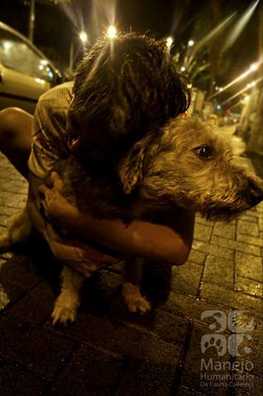
A pet is certainly a great friend. After a difficult day, pet owners quite literally feel the love.
In fact, for nearly 25 years, research has shown that living with pets provides certain health benefits. Pets help lower blood pressure and lessen anxiety. They boost our immunity. They can even help you get dates.
Allergy Fighters
"The old thinking was that if your family had a pet, the children were more likely to become allergic to the pet. And if you came from an allergy-prone family, pets should be avoided," says researcher James E. Gern, M.D., a pediatrician at the University of Wisconsin-Madison, in the Journal of Allergy and Clinical Immunology.
However, a growing number of studies have suggested that kids growing up in a home with "furred animals" -whether it's a pet cat or dog, or on a farm and exposed to large animals- will have less risk of allergies and asthma, he tells WebMD.
In his recent study, Gern analyzed the blood of babies immediately after birth and one year later. He was looking for evidence of an allergic reaction, immunity changes, and for reactions to bacteria in the environment.
If a dog lived in the home, infants were less likely to show evidence of pet allergies -19% vs. 33%. They also were less likely to have eczema, a common allergy skin condition that causes red patches and itching. In addition, they had higher levels of some immune system chemicals- a sign of stronger immune system activation.
"Dogs are dirty animals, and this suggests that babies who have greater exposure to dirt and allergens have a stronger immune system," Gern says.
Date Magnets
Dogs are great for making love connections. Forget Internet matchmaking - a dog is a natural conversation starter.
This especially helps ease people out of social isolation or shyness, Nadine Kaslow, Ph.D., professor of psychiatry and behavioral sciences at Emory University in Atlanta, tells WebMD.
"People ask about breed, they watch the dog's tricks," Kaslow says. "Sometimes the conversation stays at the 'dog level,' sometimes it becomes a real social interchange."
Dogs for the Aged
"Studies have shown that Alzheimer's patients have fewer anxious outbursts if there is an animal in the home," says Lynette Hart, Ph.D., associate professor at the University of California at Davis School of Veterinary Medicine.
"Their caregivers also feel less burdened when there is a pet, particularly if it is a cat, which generally requires less care than a dog," says Hart.
Walking a dog or just caring for a pet -for elderly people who are able- can provide exercise and companionship. One insurance company, Midland Life Insurance Company of Columbus, Ohio, asks clients over age 75 if they have a pet as part of their medical screening - which often helps tip the scales in their favor.
Good for Mind and Soul
Pet owners with AIDS are far less likely to suffer from depression than those without pets. "The benefit is especially pronounced when people are strongly attached to their pets," says researcher Judith Siegel, Ph.D.
In one study, stockbrokers with high blood pressure who adopted a cat or dog had lower blood pressure readings in stressful situations than did people without pets.
People in stress mode get into a "state of disease," in which harmful chemicals like cortisol and norepinephrine can negatively affect the immune system, says Blair Justice, Ph.D., a psychology professor at the University of Texas School of Public Health and author of Who Gets Sick: How Beliefs, Moods, and Thoughts Affect Your Health. Studies show a link between these chemicals and plaque buildup in arteries, the red flag for heart disease, says Justice.
Like any enjoyable activity, playing with a dog can elevate levels of serotonin and dopamine - nerve transmitters that are known to have pleasurable and calming properties, he tells WebMD.
"People take drugs like heroin and cocaine to raise serotonin and dopamine, but the healthy way to do it is to pet your dog, or hug your spouse, watch sunsets, or get around something beautiful in nature," says Justice, who recently hiked the Colorado Rockies with his wife and two dogs.
Good for the Heart
Heart attack patients who have pets survive longer than those without, according to several studies. Male pet owners have less sign of heart disease -lower triglyceride and cholesterol levels- than nonowners, researchers say.
msn lifestyle: boomers, July 25, 2007

Time magazine, international edition. August 18, 2008
Picking a President is critical. And so is selecting a canine companion in the White House.
In these dog days of summer, let's consider the most important decision facing Barack Obama. Long ago, as he set out on this race, he made the one campaign promise he can under no circumstances break: that when it was all over, whatever happened, his daughters could get a dog.
Should this turn out to be the new First Dog, the weight of history will fall on his haunches. Things have changed since the days when George Washington could name his hounds Drunkard, Tipler and Tipsy. Warren Harding's Airedale Laddie Boy had a valet and occupied a hand-carved chair at Cabinet meetings. Ulysses S.Grant told his White House staff that if anything happened to his son's beloved Newfoundland, they'd all be fired. Teddy Roosevelt had, along with a badger, a toad, some snakes and a pig, a bull terrier named Pete who once ripped the pants of a French ambassador. Cousin Franklin's dog Fala had a press secretary, starred in a movie and was named an honorary private in the Army. George H.W.Bush's springer spaniel Millie wrote a book, which sold more copies than the President's autobiography. And then, of course, there was Checkers. Harry Truman supposedly once said, You want a friend in Washington? Get a dog.
An AP-Yahoo News poll in June found that pet owners favor John McCain over Obama, 42% to 37%, with an even bigger edge among dog owners. One respondent explained that it "tells you that they're responsible at least for something, for the care of something." Or, in the McCains' case, many somethings: their menagerie includes turtles Cuff and Link, many fish, some parakeets, Oreo the cat and four dogs, among them terriers Lucy and Desi. Obama could take comfort in his 14-point lead among non-pet owners, except that they form a distinct minority of U.S. households.
However this goes, the Obamas are looking at a major life change, as the McCains, among others, could tell them. A dog was never an option in the Manhattan apartment where I grew up, and my daughters knew that training the dog they so desperately wanted was nothing compared with training me to accept one. The day Twist arrived, the rhythms of our house changed. Morning came sooner, they were all so eager to play; night broke into pieces, for dispensing puppy comfort. As the days went by and we forgave her accidents and idiosyncrasies, we saw her willingly forgive ours: she offered a kind of unreserved, undeserved and unconditional love that made us all more gentle and generous and tuned to the fun in the simplest things. Snow is for rolling in. Fireflies are for chasing. People smell good. When things go wrong, nap. These reminders and revelations were a gift to our family -and could be only more valuable if your house should turn out to be at 1600 Pennsylvania Avenue.
Time magazine, international edition. August 18, 2008. Page 52
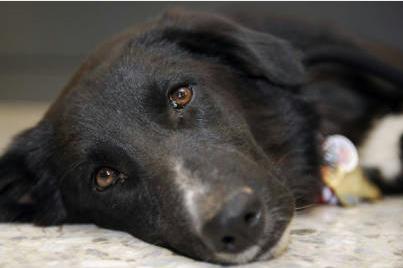
Army Spc.Gwen Beberg of Minneapolis says she couldn't have made it through her 13-month deployment without Ratchet, who she and another soldier rescued from a burning pile of trash in May.
Ratchet, wearing a dog-bone-shaped collar with his name, will spend two nights in a kennel before flying to Minneapolis, where Beberg's parents will pick him up. Beberg is scheduled to return home next month.
"I'm very excited that Ratchet will be waiting for me when I get home from Iraq! Words can't describe it," Beberg said in an e-mail to friends and family. "I hope that Ratchet's story will inspire people to continue the efforts to bring more service members' animals home from Iraq and Afghanistan."
The dog was rescued by Baghdad Pups, run by the Society for the Prevention of Cruelty to Animals International. The group, which has now brought 63 animals to the U.S., says the effort both saves dogs and cats and helps soldiers who benefit from the bond with the animals.
The military bars troops from caring for pets while on duty or taking them home, citing reasons such as health issues and difficulties in caring for the animals. The military didn't prevent Ratchet from leaving but said it wouldn't be responsible for transportation.
Baghdad Pups coordinator Terri Crisp, who brought the puppy back from Iraq, said animals adopted by soldiers help them get through difficult times.
"I hope Ratchet and his story will lead to some dialogue with the military," Crisp said as she stroked the puppy.
Ratchet flew on a charter flight to Kuwait, then flew commercial from Kuwait to Amsterdam and on to Washington. Eagan, Minn.-based Northwest Airlines picked up the cost of the last two legs.
Ratchet frolicked on a grassy patch outside the airport before heading off to Clocktower Animal Hospital in Herndon, Va., for a checkup and some shots.
The Associated Press, Oct.20, 2008
"Dogs are not attached to any gender," says Alan Beck, professor of human-animal studies at Purdue University. "They have no age, no race, no background. You don't have to justify anyone's love for them."
Time magazine, international edition, January 26, 2009. Page 47
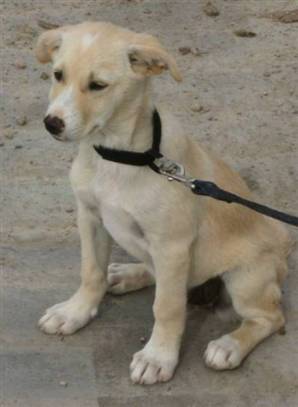
Even among the heroic tales of sacrifice of the nearly 5,000 troops who have died in Iraq and Afghanistan, Maj. Hutchison stands out. At 60, he was the oldest combat death in either conflict. He was a decorated Vietnam vet with a doctorate in psychology. The father of two grown daughters, he had wanted to rejoin the military after the Sept. 11 attacks, but listened to his wife, who didnít want him to go. After she died of cancer in 2006, Hutchison re-enlisted, with tours in Afghanistan and Iraq as an adviser to Iraqi forces.
Hutchison's unit found Laia at just 1 month old in Basra. The local vet said he would have to euthanize the dog unless they adopted her as a mascot. As policy, soldiers are not supposed to adopt strays, and Hutchison defied orders to get rid of the dog, even moving her from base to base, his friend, Sgt. Andrew Hunt, told the SPCA. "He ignored this request several times up until it began to move toward punishment," Sgt. Hunt said. "See, you couldn't ever tell the Major he couldn't do something, he [was] a stubborn old goat set in his ways. It was an endearing quality we loved about him."
Long tours in Iraq have led many soldiers to adopt animals, SPCA International spokeswoman Stephanie Scroggs told PEOPLE Pets. "As soon as soldiers adopt a dog or a cat, it just seems very transformative in many of their lives," she said. That seems to have been the case with Hutchison, who let Laia sleep in his bed and ride in his lap. "Whenever Laia was around, his demeanor and personality changed 1000 percent," Hunt told the SPCA. "He was never without a smile, he was so much happier in life, it was amazing."
Hunt helped arrange Laia's transport home and his family will temporarily take care of the dog until she moves to Michigan to live with her new family, including two kids.
But first, Laia must complete the most difficult part of her journey: traveling to the Baghdad airport in the care of a contractor hired by SPCA International. Although the trip is only about 300 miles, it will take two days. Then Laia, now just under 1 year old, will join three other dogs on a flight to the United States with Operation Baghdad Pups program manager Terri Crisp, making Laia the 147th pet saved by the group.
Leaving Iraq for a new life -and escaping mass government-sponsored exterminations- is not an easy option for many of the dogs that soldiers befriend, and that's where Operation Baghdad Pups comes in. Earlier this year, in a case that touched people around the world, Gwen Beberg worked with the program -and fought the Army- to get her dog Ratchet out of Iraq. Right now, 50 soldiers are on the waiting list to move their pets out of the war zone, and each rescue can cost up to $4,000. The SPCA International is hoping for more donations to fund happy endings like Beberg's.
Maj. Hutchison's brother, Sgt. Richard Hutchison, told the SPCA that his brother always loved dogs and often talked about Laia in his phone calls. The rescue of Laia means so much to the family that Richard will meet the dog at Washington Dulles International Airport for her June 1 arrival.
"Laia has brought so much joy and happiness into our lives, and we cannot express how much she has touched us all," Hutchison told the SPCA. "As a final act for our brother, we want to send his dog home."
MSNBC Today, May 29, 2009.
Mandy, a 45-pound Wheaten terrier, sat docilely by her masterís side Thursday as David Grounds, his right hand heavily bandaged, revealed just how far a man will go to save his furry companion.
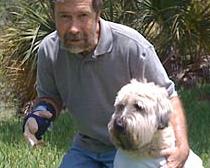
"It wasnít a bad trade," the 66-year-old Grounds said from his home in West Palm Beach, Fla. "Mandy for two fingers."
On Saturday, July 18 heíd watched in horror as the dog heíd had since she was a puppy seven years ago ran to the edge of a backyard pond and was snatched by a 7-foot alligator.
Without a thought for his own safety, Grounds ran through the brush to the waterís edge, where the gator had what it thought was breakfast clamped between its crushing jaws. "I just grabbed the lower jaw with this hand and the upper jaw with this hand," he said, indicating his bandaged right hand and his left.
At this crucial moment, Grounds remembered something heíd heard long ago: If you jab a gator in the eye, it will release whatever itís got hold of. Grounds jabbed, the alligator let go of Mandy.
"When he released Mandy for a split second he was still frozen, and he didnít move, Iím thinking, ĎOK, that was easy, but now what do I do?í I knew I only had a split second before it started reacting, and I tried to throw him and run to the right. But unfortunately, he caught my right hand."
"I knew I was in big trouble when he had my hand and he was twisting, but in a split second he had broken my fingers off, and I was free and I knew I was safe from him at least," Grounds said.
The hero pet owner lost parts of his index and ring fingers on his right hand. But other than worrying about how heís going to type, he didnít seem particularly concerned. After all, his precious pet was sitting at his side.
Groundsí 25-year-old son, Joe, joined the conversation. Mandy had originally been added to the family as his pet, and Joe Grounds said his dad is a hero for what he did.
"What Mandy means to us ... sheís pretty much my little sister," Joe said, visibly emotional. "I hate even calling her a dog; I almost think thatís demeaning to her in a way. Iím very proud of my dad, and heís very heroic. Iím very thankful thatís Mandyís OK and that my dadís going to be OK and his handís going to be OK, as well."
"Sheís just a real special dog," added Joeís father, who jokes that if he hadnít saved Mandy, his wife, who is in a Miami hospital being treated for severe back pain, or his son would have killed him. So what he did was really self-preservation.
MSNBC Today, July 23, 2009.
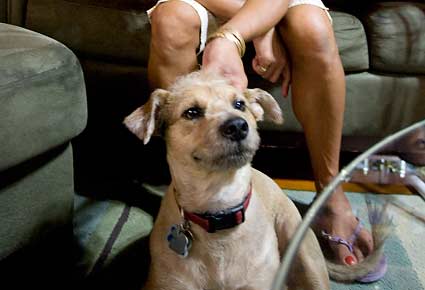
Early one morning, Yolanda Segovia's neighbor, Stacey Savige, knocked on her door and asked her to temporarily take in a stray dog she had found. The scruffy terrier mix had no collar or microchip. Segovia eyed the pooch -burrs sticking to his belly and mud caking his fur- and reluctantly agreed to foster him for the day.
An erstwhile hairdresser, Segovia hasn't worked since 2006. At 47, she is a survivor of breast cancer and cervical cancer. A divorced single mother of two, Segovia shares her Port Tampa, Florida home with her 10 year-old son Azaiah and 21 year-old son Christian. Her elder son has Down Syndrome; he cannot speak or bathe himself, and he has had heart surgery and a kidney transplant, reports the St. Petersburg Times.
Azaiah immediately took to the dog, whom he named RaeLee (pronounced "Riley"). Segovia and her sons bought the dog a collar, leash, ball and brown bed from the dollar store, and all that day, Azaiah played with the dog, laughing gleefully whenever RaeLee licked his face. "Don't fall in love with him," Segovia warned.
Segovia and Savige made 4,000 FOUND flyers with the dog's picture, stuffed mailboxes and put an ad on Craigslist. When no one called, RaeLee stayed the night at the Segovias' house. His dog bed was placed in the living room, but when the boys climbed into their twin beds, RaeLee dragged his bed down the long hallway and bunked with the boys in their room.
By Saturday -four days later- no one had called to claim RaeLee, and he was still living with the Segovias. The honey-colored terrier had started responding to his new name. He almost never barked, loved playing rambunctiously with Azaiah, and was tender with Christian.
One afternoon, the dog settled himself on the floor near Christian as he watched a "Barney" video in his room. Segovia was outside watering the plants when the placid moment was shattered by the sound of RaeLee crashing into the screen door and barking crazily. Alarmed, Segovia opened the door, only to have the dog race back through the house towards the boys' room. Segovia followed, screaming when she caught sight of her son. Christian was "slumped over, his body writhing in a seizure, blood streaming from his nose and mouth." RaeLee stood next to him yelping, but suddenly went quiet when Yolanda reached down to hold her son.
"If he hadn't come to get me," Segovia said, "the neurologist said Christian would have choked on his own blood and died." The dog, she decided, was a keeper.
But the next day, Segovia and her sons were heartbroken when someone called to claim the dog they had come to love. Randy Cliff, 34, who lived six blocks away said he had been searching for his dog -real name Odie- for over a week. Odie had lived with Cliff, his wife, their four children and infant granddaughter. Savige cried, telling Cliff, "That dog saved my friend's son."
When Cliff came to collect his dog, RaeLee a.k.a. Odie, leapt off the Segovias' porch and into his arms. Christian watched from a window. Azaiah stood on the porch watching the man hug the dog he knew as RaeLee. "We're going to miss you," he said, tearfully.
Looking up, Cliff took in the scene -Christian looking scared, Azaiah looking downtrodden- and asked, "Is that your brother?" Azaiah nodded yes.
With a sudden change of heart, Cliff put the dog back down. "Maybe Odie was supposed to find you," Cliff told a stunned and delighted Azaiah. "Maybe you should keep him."
And that is how the kindness of strangers -Savige for rescuing a lost dog, Segovia for taking him in, and Cliff for giving up his pet to a pair of brothers who needed the dog more- brought RaeLee to live with Azaiah, Christian and their mother.
Helena Sung
Pawnation, August 11, 2009.
The shepherd mix was featured on "The "Oprah Winfrey Show" and local media for her heroics in Afghanistan, got loose from her owners on Friday and was put down on Monday after spending the weekend in a county shelter.
An unidentified employee at the Pinal County facility was placed on administrative leave after euthanizing the female shepherd mix by mistake, county Animal Care and Control officials said.
"I'm heartsick over this," Ruth Stalter, the county animal control director, said in a written statement. "I had to personally deliver the news to the dog's owner and he and his family are understandably distraught."
Stalter said that the shelter works hard to reunite lost pets with their owners and that an investigation had been launched to determine how the mistake was made.
"When it comes to euthanizing an animal, there are some clear-cut procedures to follow," Stalter said. "Based on my preliminary investigation, our employee did not follow those procedures."
Sgt. Terry Young, the owner of the dog, told The Arizona Republic, "I just can't believe that something like this would happen to such a good dog."
Target frightened a suicide bomber inside a military base and potentially saved dozens of soldiers' lives, Young said.
According to "The Oprah Winfrey Show" website, Target and two other stray dogs, Sasha and Rufus, were adopted by U.S. troops in Afghanistan after wandering into a military compound there.
The three dogs were hailed as heroes after attacking a suicide bomber who entered the compound, apparently headed toward barracks with some 50 soldiers inside.
Sasha was badly injured when the bomber detonated an explosive device and had to be euthanized, but Target and Rufus survived and were brought home with soldiers returning from their tour of duty in Afghanistan.
Young said the dog was treated like royalty at the base at Dand Patan, near the Pakistan border. Target was brought to the San Tan Valley area southeast of Phoenix in August, when Young returned home.
"He had personally been profoundly affected by this dog's heroism and had worked very hard to bring the dog back over here," Pinal County spokeswoman Heather Murphy said.
After the dog escaped from the family's back yard Friday, Young put out online notices and contacted TV stations that did reports on the missing hero dog.
A neighbor found Target wandering later Friday, put her in his back yard and called the pound. The dog did not have a microchip or tag.
On Friday night, Young found Target's picture on a website used by Pinal County's dog catchers to help owners track lost pets. Young figured the shelter was closed for the night and weekend.
He showed up at the shelter in Casa Grande to claim his dog on Monday, only to find out she was dead.
County officials say the employee mistakenly took the dog out of its pen Monday morning and euthanized it.
The Republic said Young and his family will get Target's cremated remains.
MSNBC.com, November 16, 2010.

Marine Staff Sgt. Steven Smith was serving his fifth deployment, this time on a fire base in Afghanistan, when he says he was "adopted" by an 18-month-old black Labrador retriever named Miranda.
She had recently lost her litter of seven puppies to illness. The days were heating up, and Smith began to allow Miranda to cool off in his room.
"When you're living in the conditions that we're living in over there and you have a dog that lives on that base, it brings so much joy to people that are there," he says. "It's just you, and you're out in the middle of nowhere, and you got this one dog that, you know, runs around and barks at everything."
The relationship between Smith and Miranda changed one day when the dog went out on patrol with the Marine and came under Afghan attack. As a result, the pair would form a bond that set in motion a new future for both soldier and canine -- as well as Smith's wife, Vanessa, and their dog, Irwin.
"We did a patrol outside of our fire base," Smith recalls, "and she stayed the whole time with us. We actually got in some serious confrontation with the enemy. She stayed there the whole time as everything was going off, explosions and machine gun fire.
"She walked off and I lost her. And we had to go back to the base. She showed up a day later, just skin and bones. She had been beaten up and came back severely traumatized from the event. But she found her way back to me. That was the big deciding factor. I told Vanessa, 'We gotta bring her back. There's no way I can leave her there after this.' "
His wife went to work on a plan to bring Miranda to the States and quickly realized it was going to be expensive.
"At first we were skeptical and kind of scared that we were going to have to raise all this money," Vanessa says, "because I knew from looking at [Steven] that there was no way that we were going to leave her there." But it was the Internet to the rescue.
"Everybody posted on their own Facebook page and forwarded it to all of their friends and it was awesome," she says.
Vanessa was contacted by United We Roll, an online radio show that helped raise some of the $4,000 it took to bring Miranda to the United States. Within two weeks, between the listeners and the Smiths themselves, they had raised half the money. "There is a lot of support out there to get these dogs home," Smith says.
The couple was also referred to Darlene White of San Diego Animal Support Foundation, who had helped a friend bring his dog home from Afghanistan and provided the other $2,000 needed. The foundation's connections were instrumental in Miranda's transport.
"We had an Afghani that was working with us that was going home," Smith says. "So I asked him if he would take Miranda with him, and I gave him about $200 so that he could fly into Kabul and take the dog with him, along with one of our friend's dogs."
Once in Kabul, Miranda stayed at Haven for Homeless Critters, founded by Pamela Constable, a Washington Post journalist and trusted resource of White. While Miranda spent three weeks in Kabul, Constable and White joined forces and arranged for the dog's 20-hour flight to New York.
Miranda made that journey in the plane's cargo compartment with no food or water. When the plane landed, Brigid Fittzgerald, a colleague of White, met the pup and provided her with a veterinarian visit and two-day rest before the final leg of her journey: a $400 Pet Air flight from New York to San Diego. That time she traveled in the main cabin with food, water and attendants.
The dog arrived into the welcoming arms of Vanessa well cared for and rested.
Steven got home a few weeks later.
Paw Nation, April 14th, 2011
The latest research adds to growing evidence that dogs can interpret both human body language and general behavior, and use it to their advantage.
"Dogs and [human-raised] wolves are capable of distinguishing between a person looking at them, someone who's paying attention and someone who's not," said Monique A.R. Udell, lead author of a study published recently in the journal Learning & Behavior. "They're more likely to beg [for food] from someone paying attention to them."
Researchers have been learning more and more about the surprising capabilities and intelligence of Canis lupus familiaris, better known as the domestic dog.
One recent study found that dogs have the developmental abilities of a human 2-year-old, with the average dog capable of learning the meanings of 165 words.
"Over the last 5 years or so, we've been trying to understand how dogs and relatives of dogs such as wolves respond to social companions," explained Udell, who was a researcher at the University of Florida in Gainesville when the study was conducted.
"The idea behind this particular study was to try to understand how it is, for example, that dogs can use cues of attention to predict what we're going to do next and use that information to decide to beg for food from one individual and not another?" she continued. "How is it that dogs make us feel that they know what we're thinking?"
The study involved groups of pet dogs, stray dogs from a shelter and hand-raised wolves (named Tristan, Miska and Marion, among other monikers) who were comfortable around humans.
Two people stood about 6 meters apart, one of them looking directly and continuously at the dog or wolf. The other person had their vision blocked, either with a bucket over their head, a book obscuring their face or because their back was turned. Both humans held a piece of food.
"On average, both dogs and wolves were significantly more likely to be begging from the person looking at them when the other person's back was turned," said Udell.
But levels of sensitivity did vary by how domesticated the dog or wolf was.
"Domesticated dogs were more likely to beg from someone paying attention to them, but shelter dogs and wolves who don't often see a person reading books were not likely to get that cue," Udell related. "So it does seem like specific life experiences really do matter in this context."
The findings, said Udell, are "important because previous research suggested that something happened to dogs during genetic domestication that made them begin to think like humans. This shows that wolves are capable, if reared with humans, of [picking up human cues]."
"Animal people in the scientific community have known for some time that dogs are pretty smart and very good at reading our body language," said Adam Goldfarb, director of the Pets at Risk Program of the Humane Society of the United States. "This shows that something about dogs or wolves inherently allows them to read humans far better than other animals can."
msn Health, July 16, 2011
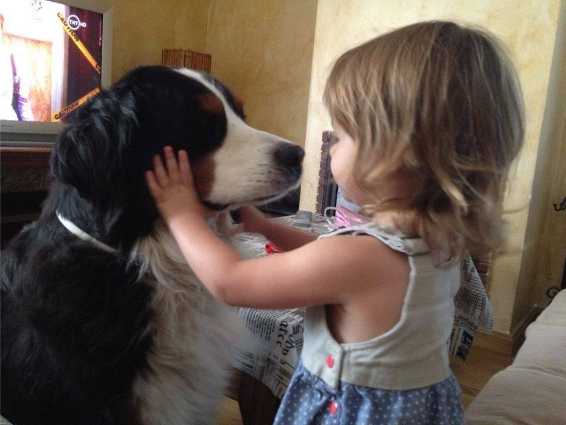
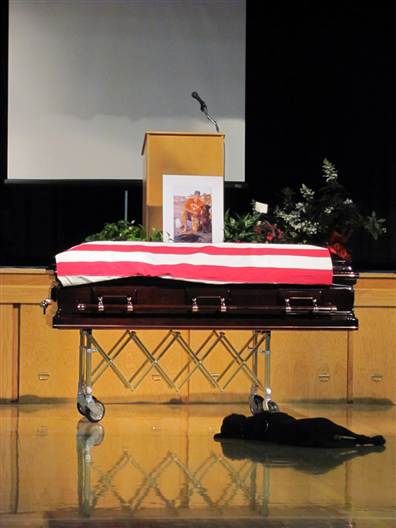
Navy SEAL Jon Tumilson lay in a coffin, draped in an American flag, in front of a tearful audience mourning his death in Afghanistan. Soon an old friend appeared, and like a fellow soldier on a battlefield, his loyal dog refused to leave him behind.
Tumilsonís Labrador retriever, Hawkeye, was photographed lying by Tumilsonís casket in a heart-wrenching image taken at the funeral service in Tumilsonís hometown of Rockford, Iowa, earlier this week. Hawkeye walked up to the casket at the beginning of the service and then dropped down with a heaving sigh as about 1,500 mourners witnessed a dog accompanying his master until the end.
Hawkeye was such a huge part of Tumilsonís life that Tumilsonís family followed the dog down the aisle as they entered the service in front of a capacity crowd in the gymnasium at the Rudd-Rockford-Marble Rock Community School. Hawkeye then followed Tumilsonís good friend, Scott Nichols, as Nichols approached the stage to give a speech. As Nichols prepared to memorialize his friend, Hawkeye dutifully laid down near the casket.
The loyal Labrador will now be owned by Nichols, Tumilsonís friend.
MSNBC.com, August 25, 2011.
It is possible to take something beautiful and lasting out of the heart-wrenching experience of seeing the animal you love move inexorably toward death. Nobody can take the grief away, nor should anyone try, but our love for animals is nothing but a gift, and it keeps on giving, even when they go home.
A man named Harry, an Iraq war veteran and tennis coach from Minnesota, hit upon a simple and profound idea to transform this otherwise sad experience into a blessed one.
It was a gray morning when the vet told Harry that his dog Duke's heart was failing and that it wouldn't be long before he died. Harry was not surprised, but still, the news depressed him. Listening to the vet, Harry later told me, he'd gotten an idea, one he thought would pay tribute to his life with Duke and give him something to feel besides sadness and loss.
"Tomorrow, I'm going to give you a Perfect Day," he said quietly to Duke as they left the vet's office. He would take the day off from work and create a sweet memory with his dog. It would be a special day, filled with all the things Duke loved most, as close to perfect as Harry could make it. He would take his Canon PowerShot along to capture some images of the day, to preserve the memories.
Duke was a border collie/shepherd mix. He had always been a lively, energetic dog and would herd anything that moved. Walks, work, food, Frisbees, red ballsóthese were the things Duke loved, along with chasing balloons and popping them.
Harry went shopping for supplies, and when he came back Duke was napping on his dog bed. He went over, lay down next to the dog, and hugged him. "Pal," he whispered, "tomorrow is for you, your Perfect Day." He was embarrassed to tell his wife, Debbie, about the plan, but she sensed what was going on and gave the two of them the space they needed. It was her belief that the dog, more than anything else, helped Harry heal from the trauma of Iraq. He couldn't look at Duke without smiling, and when he had first come home, he hadn't smiled too often.
At eight the next morning, Harry got up. Duke was lying on his bed, which was next to Harry and Debbie's. The dog rose a bit slowly, then followed Harry down the stairs and into the kitchen. Harry opened the refrigerator and took out a hamburger patty and two strips of bacon, cooked the night before. He put them on a plate and into the microwave.
Duke was riveted. When the plate came outóHarry touched it to make sure it was warm but not hotóhe dumped the meat into Duke's bowl, along with his heart pills. It was as if Duke couldn't believe his eyes. He was almost never given people food. Looking up at Harry, as if asking permission, he waited until Harry nodded and said, "OK, boy," before inhaling the food.
A feeling of sadness came over Harry as he thought about how Duke would soon be gone. He wandered into the living room and lay down on the couch. Duke came over and curled up next to him. Harry began to sob, softly, then more deeply and loudly; Duke gently licked his face.
After a few minutes, Harry rose to get dressed. Although he worried about straining the dog's heart, he let Duke follow him up the stairs. On this day, Duke could do anything he wanted. No corrections. He sat on the bedroom floor and watched Harry put his clothes on. When Harry said "Sneakers," Duke labored to get up onto his feet, walked over to the closet, and brought Harry his white running shoes. Harry had enjoyed training his dog to bring him his sneakers, and Duke seemed to love it too.
Harry went back downstairs, followed by Duke. He picked up a bag from the pantry and walked out into the yard. Inside the bag were two dozen high-bounce red balls. One at a time, he threw them and bounced them off the back fence. Duke tore after one gleefully, then another, catching some, narrowly missing others as they whizzed past his head.
When Duke started to pant, Harry stopped.
Next they went to the town pond. Harry sat by the water's edge while Duke waded in, paddled around, swam back, shook himself off, then repeated the routine about a dozen times. Every few minutes Harry tossed the dog a liver treat. It practically rained the small and pungent treats. Once again, Duke looked as if he could hardly believe his good fortune.
They came back to the house and napped. After lunch, Harry took Duke to the vast state park outside of town. He picked a flat, gentle trail, and the two of them walked a couple of miles. Eventually, they came to a stone abutment with a beautiful view. Harry walked over to the edge and sat down. Duke clambered out and curled up beside him. It was a gorgeous afternoon, and the wind ruffled the dog's hair. Duke held his nose up to the wind, picking up the scents of the earth.
God, I love this creature, Harry thought. I never feel this peaceful, this much at ease. It is something to remember, to honor.
They sat together for nearly an hour, enjoying a bond of complete understanding and affection. If only the world could stay like this, Harry thought, this simple, this good.
Harry knew that Duke was tired, so they took their time walking back, stopping frequently to rest. A few years earlier, Duke could have hiked all day, and sometimes they did that together. But not anymore.
When they got home, Harry cooked Duke some prime sirloin, then chopped it up. The dog was beside himself, looking up at Harry as he ate, expecting the food to be taken away. That evening, Harry put one of his favorite Clint Eastwood movies into the DVD player and Duke hopped up onto the couch, put his head in Harry's lap, and went to sleep. When the movie was over, Harry carried the dog up the stairs and laid him down on his bed.
Several weeks after the Perfect Day, when Harry came home from work, Duke was not there by the door to greet him, and he knew he was gone. He went into the living room to find Duke dead. He knelt by his dog, closed his eyes, and said a prayer. Then he dug a deep hole in the backyard and buried Duke there, along with some bones, his collar, and some of his beloved red balls.
Of all the photos Harry took on the Perfect Day, the one he loved the best was of Duke sitting out on the stone ledge in the state park, taking in the sights and smells.
Now every morning before he goes to work, he flips open his cellphone and smiles at the picture of Duke, looking for all the world like a king surveying his territory.
Harry passed on the idea of the Perfect Day to friends and other dog owners struggling to come to terms with their own pets' failing health. Many have since shared with him the stories of their dog's Perfect Day. It makes him happy to think about Duke's legacy -all those Perfect Days for all those other great dogs leaving our world behind.
Slate, September 29, 2011.
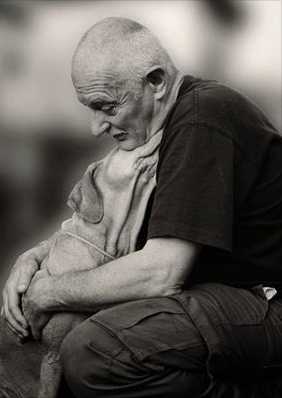
It was supposed to be a happy ending story for a dog named Bill who was the only survivor of a litter of 6 puppies that were nursed back to health by members of the Lone Star Battalion. Sgt. Jon Staffen had become very attached to the black and white pup and wanted to bring him back to his hometown of Dayton, to live.
A website raised $12,000 in donations to care for Bill at an animal shelter in Kabul and pay for his trip to Pakistan and then the United States. But Staffen recently learned that Bill got sick with the deadly Parvo virus and died in late November.
"Bill was a fighter. He survived as a 9-day-old puppy in Afghanistan. Kind of hoped he'd pull through," said Staffen. "But it was a bad disease."
After considering what he should do about the sad turn of events, Sgt. Staffen asked the animal shelter if there was another dog he could rescue. The shelter told the soldier about an injured dog who walked with a limp. Because of the dog's condition they didn't think it had a future in Afghanistan.
On Monday afternoon after a 20-hour journey, a crate with the name "Limpy" landed at George Bush Intercontinental Airport. Sgt. Staffen anxiously opened the crate and out popped a small brown, female dog. At first the soldier was surprised to see a female dog. He hadn't considered that possibility, but once he and the pup took a quick run he knew they wouldn't have any problem bonding.
Staffen originally wanted to bring Bill back to the U.S. as a way of saying thank you to the puppy for giving him hope. Instead he plans to raise his new dog ..."in a place that's not so hostile where she can actually lead a fulfilling life- just as I would have done for Bill," said Staffen.
The Marine has decided to call his new dog, Holly.
Care2 causes, December 13, 2011.
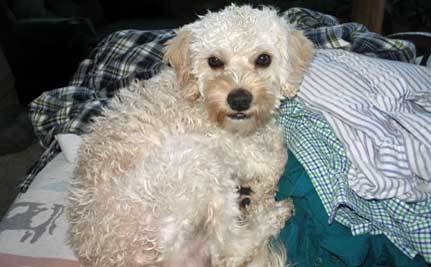
On January 14, we adopted a new dog. He was found tied to a tree a week earlier and brought to the veterinary clinic where my husband works. There he waited for his family to retrieve him. No one came, which meant, at week's end, he needed a new home. About a year old, dirty, thin and matted, Henry Hershel (as we're calling him) joined our crew of two dogs and a cat. He wasted no time in endearing himself to us and seemed very happy to join our family. Because I work at home, I'm with the animals most of the time. Henry Hershel is now always by my side, curled in a ball by my feet at my desk when I work, hovering by me when I make dinner and under the table when we eat.
After my husband neutered him and Henry Herschel had to rest after surgery, I left him in the office with the Institute for Humane Educationís office manager, Amy Morley, when I took the other dogs for a hike. Since we share the same building, it didn't seem like it would be stressful for him to be with Amy, whom he clearly liked from the moment he met her. But while he may have liked Amy, Henry Hershel had bonded so strongly with us that he cried when I was gone, seemingly inconsolable for the few hours I was away.
A week after we adopted him, we went out for a couple of hours, leaving all the dogs at home, and my husband set up his computer to videotape our living room in our absence. Given Henry Hershel's sadness when we left him with Amy, we wondered how he'd do when left in the house with the other dogs. Stealth videotaping seemed like a good way to find out. When we returned there was nothing amiss. The dogs all greeted us happily, and there were no chewed pillows or furniture, and no accidents on the floor. Nothing would indicate that Henry Hershel had been at all upset by our absence. But then we watched the video. Henry Hershel cried plaintively when we were gone, settling down for a while only to howl after 30 minutes, 45 minutes, 60 minutes, and so on.
Itís amazing to me that there are people who believe that animals don't feel. Henry Hershel shows every sign of feeling as deeply, if not more deeply, than humans. Whether what he was feeling during our absence was sorrow, fear, loneliness, yearning, anxiety, longing, worry, loss, or some combination of these or other emotions, I cannot be sure, but he is certainly feeling something. His utter delight upon our return offers a glimpse into his other, more positive feelings. Like us, his spectrum of emotions is wide.
So I ask myself: What are our obligations and responsibilities to other animals, whether dogs, or other mammals like pigs, rabbits or rats, or birds like parrots or chickens, who are able to suffer, delight, bond, love, fear and experience a range of other emotions in varying degrees? And I always come back to this: To the best of our abilities, I believe that we ought to cause the least amount of suffering we possibly can to all sentient beings, human and nonhuman. If we donít have to kill or cause harm, I believe we ought not to. If we can bring happiness, I believe we ought to do so to the best of our ability. This, to me, is an inevitable extension of the golden rule to do unto others as we would have them do unto us, and an essential element of the MOGO principle to do the most good and the least harm to others.
I hope that Henry Hershel will soon come to realize that we will always come home after a few hours; that he needn't worry or mourn. We won't be tying him up to any trees. We won't abandon him. We'll love him with all our hearts for the rest of his life.
Zoe Weil
Care2 causes, January 26, 2012.
The Harrises, ages 68 and 55, had a beautiful marble bench custom made to fit around a tree on the plot, and many of their loved ones are already buried in adjoining plots.
So what makes their situation worthy of a mention? The cemetery they selected was a pet cemetery -and the loved ones they want to be buried near are their dogs. And last year, the state of New York banned the burial of human remains in pet cemeteries, leaving the Harrises- along with several other pet lovers with similar plans -in a lurch.
The burial of human remains in pet cemeteries isn't exactly commonplace, but it's a practice that's been happening across the nation quietly for years. But last year, Hartsdale Pet Cemetery and Crematory, the oldest operating pet cemetery in the world and where the Harrises had purchased plots for themselves, was thrust into the news when the state required them to stop.
A number of people had already purchased plots at Hartsdale, located just outside New York City in Westchester County, with plans to be buried there ó in some cases, such as with the Harrises, thousands of dollars had even been spent on a custom marker for the spot. In others, the plot holder had already passed away, and their loved ones were simply trying to carry out the deceasedís last wishes.
Taylor York, a New York attorney and professor of constitutional law, was at a standstill: Her aunt had been laid to rest alongside her dogs in Hartsdale in 2008, but her uncle passed away in 2010 after the Board instituted the ban, and York was unable to bury him with his wife and their beloved dogs.
Even among true animal lovers, who often leave direction to have their pets ashes buried with them in a regular cemetery, the choice to be buried next to oneís cats and dogs in a pet cemetery is unusual.
Human owners are buried at Pet Heaven Memorial Park in Miami, Fla., where general manager Sergio Santos says there has been an increase in requests for the service. Keith Shugart, vice president of Oak Rest Pet Gardens in Bethlehem, Ga., has seen the same trend.
Whether or not humans can be buried in a pet cemetery, and under what circumstances, isnít tracked on a national level -itís up to each county, city, and, ultimately, the pet cemetery itself, although regardless of where one chooses to be buried, itís always a good idea to specify that choice in a will.
As one might imagine, the news of a loved one choosing to be buried among pets, no matter how much those pets are loved, can ruffle some familial feathers.
"I was careful about whom I told of my plans, knowing that many would feel them strange at the very least," Kole said, who lives in Manhattan. "The good friends I did tell thought it was a wonderful idea. I did not tell my brother, whom I love very much, until later on, as we are quite different. He is proud of my accomplishments, but he already thinks I'm somewhat eccentric and I think this ties the bow on the package. Nonetheless, he has taken it gracefully and accepts and will fulfill my plans."
Adair had a similar experience with sharing the news of her decision.
"I come from a very traditional family in terms of being buried with a church service in a family plot with other family members, etc. But when they realized I was serious, I think they came to understand that for me, it was a perfect fit."
For York's aunt and uncle, who never had children and considered their dogs their family, there was a happy ending, she reported on her web site.
Retired New York City police office Tom Ryan was laid to rest at Hartsdale Dec. 23rd, alongside his wife Bunny, and their "two Maltese babies, BJ the First and BJ the Second."
Kristen Seymour
MSNBC.com, January 27, 2012.
Last Tuesday was Nick Santinoís 47th birthday, but the soap opera actor who appeared in "All My Children" and "Guiding Light" was too heartbroken to notice. Earlier that day, he had taken his 5 year-old dog to the veterinarian to be "put to sleep".
"Today I betrayed my best friend and put down my best friend". Santino wrote in a suicide note, said close friend Stuart Sarnoff. "Rocco trusted me and I failed him. He didn't deserve this".
Santino put the blame on strict dog regulations that went into effect in 2010 in the One Lincoln Plaza apartment building where he and Rocco lived. Those regulations included a ban on Pit-bulls. Rocco and other large dogs that already lived in the building were allowed to stay, but it became apparent they were not wanted by fellow tenants or the management.
Tenants say the dog owners were subjected to "relentless pressure" to get rid of their pets. And as the owner of the only Pit-bull in the building, Santino and Rocco got the brunt of the harassment.
"People were complaining about his dog", said neighbor Kevan Cleary. "It was open season on him".
Rocco wasn't allowed to ride in the main elevators and false claims of excessive barking were filed against him. Management threatened Santino with heavy fines and restricted the number of hours he could leave the dog alone in his apartment.
Cleary said. "He felt like he was in this battle he was the only guy in the building with a pit-bull mix".
After Santino put Rocco down, he gave some of his dog treats to the doorman of the building. The doorman said his eyes were overflowing with tears. Later he left Rocco's dog bed and two rawhide bones at the doors of other neighbors.
That night Santino made a final call to his former girlfriend and at 2 a.m. on Wednesday, police found his body in his bedroom. He passed away after an apparent overdose on pills.
Nick Santino who was raised in an orphanage and foster homes, adopted Rocco from a shelter. He wrote on his Facebook page, "I did not rescue Rocco, Rocco rescued me".
Rocco's ashes will be buried with Santino.
Meanwhile the board of directors at One Lincoln Plaza say they are not responsible for Santino's death. "It's all a shame, condo board member Marily Fineman told the New York Post: 'But it has nothing to do with the pet policy'".
Sharon Seltzer
Care2 causes, January 31, 2012.
A determined 22-month long legal battle and a heartfelt social-media campaign for Lennox the dog, came to a sad end on Wednesday. The 7-year-old dog was euthanized in Northern Ireland because his appearance resembled a pit bull terrier, a breed that is banned in the country.
A statement from the Belfast City Council said it had humanely destroyed "one of the most unpredictable and dangerous dogs" that its appointed expert had ever come across. The council said they carried out the court-ordered euthanasia for reasons of public safety and "a sustained campaign of abuse" against city officials from protestors.
Lennoxís story began two years ago when he was taken into custody because he looked like a pit bull dog. Pit bulls and pit bull mixes are outlawed in Britain.
Caroline Barnes, who owned Lennox, testified in court that her dog was a bull dog mix, not a pit bull terrier and that he had never bitten anyone. She asked the court to let her move Lennox outside of Northern Ireland in an area that did not have breed specific legislation. She wanted Lennox to come to a sanctuary in the United States.
News of Lennox's case launched a massive online campaign by animal lovers in Britain and the U.S. to save the dogís life. The commitment of tens of thousands of "Save Lennox" fans, LennoxArmy followers and Care2 petitioners continued during the entire 22-months he was imprisoned.
Barnes fought for her dog's life in the court system until the very end. After nearly two years, Lennox's fate was determined last month when an appeal was dismissed by Northern Ireland's senior judges. The judges upheld two 2011 rulings to have Lennox euthanized.
Meanwhile Lennox endured the time at a municipal animal shelter in Belfast where employees claimed he was becoming more aggressive and unpredictable.
Councilman Pat McCarthy said, "The people looking after Lennox for the past two years said that one minute the dog was placid and friendly, and the next he would try to get through the fence to get at you."
Perhaps Lennox was getting as frustrated with the legal process as the humans fighting for his life.
Victoria Stilwell, host of Animal Planet's "It's Me Or the Dog," said "I hoped Belfast City Council would realize that there were alternatives that provided a sanctuary for Lennox in the USA where he would be safe, but they did not listen."
On the final day Caroline Barnes and Lennox were refused the last shred of humanity that could have been given; Barnes was not allowed to be with her dog when he died.
A Facebook page for Lennox gave an "official statement" from the family: "We have been denied the opportunity to say goodbye. We have also been told that we cannot collect his body and bring Len home. We have been informed, however, that we will receive 'some' ashes in the mail."
Rest In Peace, Lennox.
Sharon Seltzer
Care2 causes, July 11, 2012.
David DiSalvo
Forbes on line, August 8/12.
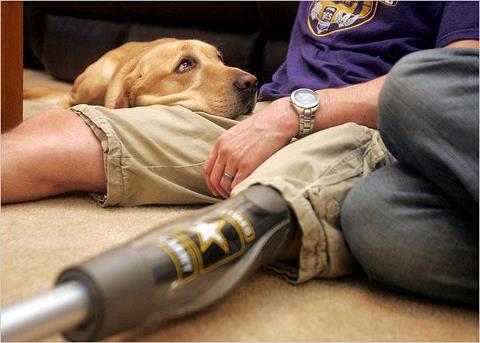
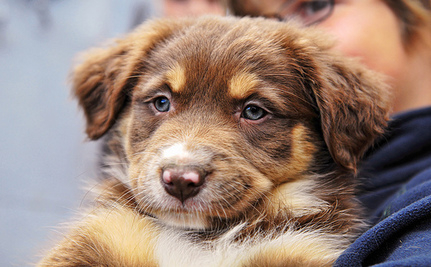
Late in 2011, the American Humane Association launched a one-of-kind study to understand why 3 to 4 million adoptable pets are euthanized every year in shelters across the country. "Keeping Pets In Homes" is a 3 part study to curb pet homelessness. The goal is to learn why some people adopt a cat or dog, some remain pet-less and others surrender them to shelters. The first phase of the research was just released and the results are very interesting.
While there are 117.5 million households in the U.S., only 46.3 million have a dog in their family and 38.9 million own a cat. That leaves 27.5% of the households in America without a pet. The first phase of Keeping Pets In Homes examined the reasons why so many people do not share their lives with furry friends.
Funded by a generous grant from PetSmart Charities, phase one, "Reasons For Not Owning A Dog Or Cat," interviewed 1,500 adults who previously owned a pet and non-pet owners to determine the reasons behind their decision. Understanding the respondentsí hesitation to bring a cat or dog into their families is the first step toward developing effective strategies to get more homeless pets adopted.
Phase one also examined if people in the study were open to the possibility of becoming a pet guardian in the future. Here are the top reasons cited for not owning a cat or dog:
Surprisingly, people named the death of a previous pet as the top reason why they did not currently have an animal in their household. 20% of dog owners and 17% of cat owners said the stress of watching a beloved pet grow old and die was so traumatic they had chosen not to go through experience again. When respondents were asked if they were open to the possibility of pet ownership in the future they said:
Some of the data from the study was discouraging. More than a third of non-pet owners said they dislike cats and only 22% of previous dog owners and 18% of former cat owners said they obtained their past pets from a shelter or rescue group. And despite the documented health and emotional benefits of pet ownership, an overwhelming 90% of seniors said they were not open to owning a dog or cat in the future.
"There are still significant hurdles to overcome in helping to keep more of these healthy, adoptable animals out of the nationís shelters," said Dr. Patricia Olson, chief veterinary advisor for American Humane Associationís Animal Welfare Research Institute. "Using the data gathered and the work to be done in future phases of this study, we hope over time to decrease pet homelessness and relinquishment."
"By understanding the reasons why so many Americans do not own a pet, and learning what we can do to increase lifelong retention of those that do," said Dr. Robin Ganzert, President and CEO of the American Humane Association, "we can take the necessary steps to change minds, change policies and change activities to help get more of these beautiful animals out of shelters and into the arms of loving families."
Phase 2 of the study is underway. The focus is to examine people who have adopted a cat or dog in the last six months from public and private shelters in 3 major cities and determine how they and their new pets are adapting.
Sharon Seltzer
Care2 causes, August 14, 2012.
German shepherd Capitan ran away from home after the death of Argentinian Miguel Guzman in 2006.
A week later Mr Guzman's family went to pay their respects and found the heartbroken pet sitting by his owner's grave, wailing.
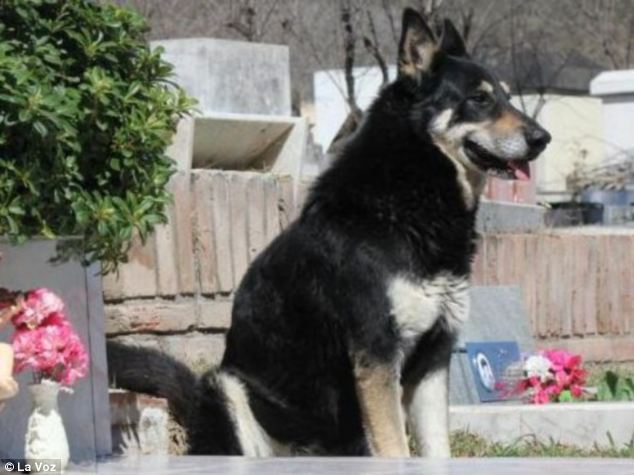
Since then the grieving dog has rarely left the spot at the cemetery in the town of Villa Carlos Paz, central Argentina.
Mr Guzman bought Capitan as a present for his 13-year-old son Damian in 2005.
He died suddenly in March the next year, but by the time his family had returned home from the funeral Capitan was gone.
Mr Guzman's widow Veronica told Argentina's Cordoba newspaper: 'We searched for him but he had vanished. We thought he must have got run over and died.
'The following Sunday we went to the cemetery and Damian recognised his pet. Capitan came up to us, barking and wailing, as if he were crying.'
She added: 'We had never taken him to the cemetery so it is a mystery how he managed to find the place.
'We went back the next Sunday, and he was there again. This time, he followed us home and spent a bit of time with us, but then went back to the cemetery before it started getting dark.
'I don't think he wanted to leave Miguel on his own at night.'
The cemetery's director Hector Baccega remembers the day he first saw the dog.
He said: 'He turned up here one day, all on his own, and started wandering all around the cemetery until he eventually found the tomb of his master.
'During the day he sometimes has a walk around the cemetery, but always rushes back to the grave. And every day, at six o'clock sharp, he lies down on top of the grave stays there all night.'
Mr Baccega said staff at the cemetery are now feeding and taking care of Capitan.
Mr Guzman's son Damian said: 'I've tried to bring Capitan home several times, but he always comes straight back to the cemetery. I think he's going to be there until he dies too. He's looking after my dad.'
The story is similar to that of Hachiko, an Akita who is said to have waited at a Tokyo train station for its master to return each day for nine years from May 1925, following owner Hidesaburo Ueno's death at work.
Daily Mail, September 13, 2012.
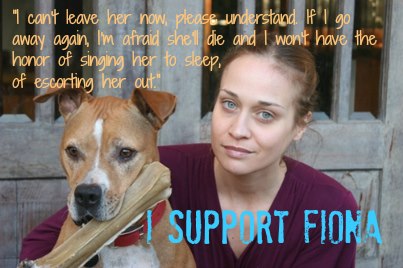
Fiona Apple has cancelled her South American tour to be with her dog Janet as she passes away.
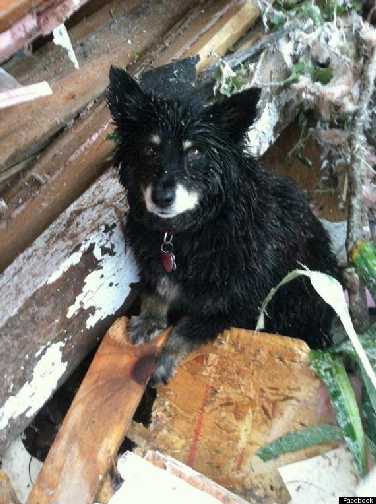
The Oklahoma County Sheriff's Department tweeted a photo of the scared, black dog, which was found alive in a pile of wreckage after a deadly EF-5 tornado hit Moore on May 20. At first he might have seemed like one more miracle, but once authorities found out why he had been sitting in that particular spot, the dog's story became even more heart-wrenching.
On Tuesday, deputies learned the little dog was actually guarding the body of its owner, who had died as a result of the storm.
Many groups are helping to reunite Oklahoma residents with their pets. The Oklahoma Humane Society is working to treat and house all injured and lost animals, while Reddit users have banded together to create threads for people looking for their lost pets.
Huffington Post, May 22,2013.
Our 14-year-old dog Abbey died last month. The day after she passed away my 4-year-old daughter Meredith was crying and talking about how much she missed Abbey. She asked if we could write a letter to God so that when Abbey got to heaven, God would recognize her. I told her that I thought we could so, and she dictated these words:
Dear God,
Will you please take care of my dog? She died yesterday and is with you in heaven. I miss her very much. I am happy that you let me have her as my dog even though she got sick.
I hope you will play with her. She likes to swim and play with balls. I am sending a picture of her so when you see her you will know that she is my dog. I really miss her.
Love, Meredith
We put the letter in an envelope with a picture of Abbey and Meredith and addressed it to God/Heaven. We put our return address on it. Then Meredith pasted several stamps on the front of the envelope because she said it would take lots of stamps to get the letter all the way to heaven. That afternoon she dropped it into the letter box at the post office. A few days later, she asked if God had gotten the letter yet. I told her that I thought He had.
Yesterday, there was a package wrapped in gold paper on our front porch addressed, 'To Meredith' in an unfamiliar hand. Meredith opened it. Inside was a book by Mr. Rogers called, 'When a Pet Dies.' Taped to the inside front cover was the letter we had written to God in its opened envelope. On the opposite page was the picture of Abbey & Meredith and this note:
Dear Meredith,
Abbey arrived safely in heaven. Having the picture was a big help and I recognized her right away.
Abbey isn't sick anymore. Her spirit is here with me just like it stays in your heart. Abbey loved being your dog. Since we don't need our bodies in heaven, I don't have any pockets to keep your picture in so I am sending it back to you in this little book for you to keep and have something to remember Abbey by.
Thank you for the beautiful letter and thank your mother for helping you write it and sending it to me. What a wonderful mother you have. I picked her especially for you. I send my blessings every day and remember that I love you very much. By the way, I'm easy to find. I am wherever there is love.
Love, God
SAFM, June 3, 2013.
When I finally euthanized my beloved cat, Ali, a knife slashed my heart.
I'm not much of a crier, but when I said goodbye and handed Ali over to the vet, my face collapsed into a full-out bawl. My boyfriend led me to my apartment -I couldn't see through my tears- where I crawled into bed and sunk into grief.
By the next morning, my mourning was over.
I awoke feeling happy and light -almost levitated- because Ali had been sick a long time, and the decision to put her down was torture. Grief had passed, and happy memories emerged like sunlight behind a thundercloud.
I remembered the afternoon I rescued Ali from a psycho-biology lab and brought her to my studio apartment, my first home out of college. I remembered our first trip to the beach, and her blank look when I demanded she release the sparrow struggling in her teeth.
I remembered stroking her soft, white fur -Ali was short for Alabaster- and how her purr drowned out the city din when she curled around my head at night.
But these fast, fond memories unnerved me. How could my bond with Ali be so quickly and easily broken? Was I so shallow that after only a day of wailing, my feelings for my dead cat were reduced to, "Good times. Nice to know ya"?
Did ice water run through my veins?
"You gave yourself permission to grieve," says Diane Snyder Cowan, director of the Bereavement Center for Hospice of the Western Reserve, in Cleveland, Ohio. "By being able to express yourself, you had a cathartic release. Many people don't understand the grief associated with a death of a pet. They hide their feelings among people who say, 'It's only a pet.' Their grief is disenfranchised."
I thought a lot about grief after Ali's death and decided that I recovered so quickly because, unlike my connections with humans, our relationship was so simple.
"I love you; you love me."
Not, "I love you, but you make me feel less-than." Or, "You love me to control me."
My feelings for Ali were pure, unadulterated by resentment, regret, and guilt -the baggage that makes mourning people so heavy and difficult to wade through.
Of course, many people have more complicated relationships with pets, which makes their mourning a longer and harder process. Pets, for some, are sole sources of love and comfort, and living without them is like living without oxygen.
Sometimes, a pet's death dredges up buried feelings about humans who have passed.
"I've seen people who have suffered many human losses, but it wasn't until their pet passed that they sought therapy," say Anne Cattarello, a Boulder, Colo., counselor specializing in pet loss and bereavement counseling.
Whatever fuels pet grief, it's often hard to accept how much it hurts, and to share that pain with someone who won't smother it under platitudes like, "You can always get another cat."
Luckily, the helping community is beginning to pay its respects to pet grief. Therapists are seeking training in pet mourning, and pet loss support groups are springing up around the country and online.
If you're a DIY mourner, here are some ways to work through your grief.
Lisa Kaplan Gordon, Care2, July 11, 2014.
"My name is Danielle and it's been over a year since something terrible happened to me. I am ready now to share my story," explained the letter we received recently from veterinary technician Danielle Torgerson of Killeen, Texas. "Four years ago somebody brought a puppy to the clinic. I was not assigned to that room but I was in the second room when I felt something pull me into the hallway. It was strange, but I glanced into the other exam room and saw a puppy on the table. He looked at me with so much pain and despair. A man had brought him in for a 'sting' but I knew instantly that was not the case. The puppy was horribly burned on the head like somebody had poured gasoline over him and set him on fire. He was there to be euthanized."
But Danielle's conscience began to wrestle down the injustice of extinguishing this young life before it had known the simple joys that every dog should know. She wondered if he might be able to have a bed of his own. Could there be walks through the park in the cool evening air? Was it possible that this puppy might wake up each morning beside a person whose first words were his name?
"I asked the vet if something could be done," Danielle recalls. "He said that treatment could be carried out, but only with lots of money."
And that was all Danielle needed to hear. She wasn't wealthy, but she was determined and if there was a chance at recovery, she'd already made up her mind to take it. So Danielle had the man who brought in the puppy sign over custody to her. She then contacted Dr. Elaine Caplin in Austin and the puppy was brought in for a surgical consulation to see what could be done.
"He was not able to eat or drink because part of his mouth was melted," Danielle recalls.
Skingraft surgery was undertaken to reconstruct the mouth and soon the puppy's condition improved dramatically and he began to function on his own.
Danielle named the puppy D'Artagnan (who served Louis XIV as captain of the Musketeers of the Guard) or Mister D for short and introduced him to other dogs and cats who welcomed him.
Mister D began to grow into a large dog and earned a reputation for his generous nature. "He allows all the cats to sleep with him and we have actually seen him share food with other dogs. He picks out pieces of food and gives it to them."
But in the street, Mister D is sometimes regarded as a beast.
"He looks like a werewolf with his skin grafts and people are kind of scared," Danielle explains. "But he truly is my loving angel and I know that saving him is what helped save me."
You see, last year, Danielle was in a terrible motorcycle accident when she tried to avoid a collision with a car. Within seconds, she was on the ground bleeding with a broken skull and awaiting a lifelight helicopter to a trauma center where doctors would find no brain function.
For 12 days, Danielle lay motionless in her pale blue hospital gown while her mother, who flew in from Germany, went back and forth between the hospital and Danielle's home to take care of not only her dying daughter, but of the animals who meant the world to her.
At night, Danielle's ex-husband would help look after the pets so that her mother could spend more time with Danielle, and try to get some rest, but everyone feared the worst.
But in the silence of the mind, a louder voice came from Danielle's soul.
"I had to get back to Mister D and my other 'kids' because they needed me and I needed them," Danielle says of her sense that she carried that desperate need to be reunited with her pets, despite the lack of medical evidence that she was processing those emotions during her coma.
I Had to Wake Up for My Animals
"After 12 days, a miracle happened," Danielle says tearfully. "I woke up. The doctors and nurses have told me that the first words that I uttered were 'Mister D.'"
For several weeks, Danielle remained in rehabilitation while she learned to walk and to fully speak again. It seemed so painfully long for her to be away from the ones she loved and that motivated her to work harder each day.
"When I finally got home, Mister D was so happy," Danielle said. "He checked on me all the time. When he felt that I was hurting, he would put his paw very carefully on my head and sigh. I truly know that if it was not for Mister D, I would not be here. He has become my musketeer, my protector and has given me the security and protection that I never had from people."
Now fully recovered, Danielle's greatest hope is that her story will inspire others to rescue animals. She asks people to consider rescuing, rather than buying pets and explains that "the bond between you is one that can never be broken."
Laura Simpson, Care2, October 16, 2014."The domestic dog represents one of the most beautiful genetic sculptures shaped by nature and man."
Dog lovers, do you agree?
This sentence comes from a fascinating study published this week in the journal Cell Research, in which scientists from China, Canada, Finland, Singapore, Sweden, and the U.S. set out to trace the origin and evolution of the domestic dog.
Scientists have believed for a while in a two-stage process; in the first stage, primitive dogs emerged from their wild ancestors, grey wolves. The idea was that the wolves began to hang around humans, perhaps because they found food nearby. Then, as they stayed with people, they became tamer, and started performing tasks like hunting and guarding. It was over a very long time (read thousands of years) that the wolves became the first dogs. In the second stage, these primitive dogs were further selected into many different dog breeds.
That's the general idea, but the exact details of how this happened have remained in dispute.
This group of scientists (proving that we can all get along, at least in the scientific community) set out to unearth more specific details about how the domesticated dog evolved. To do this, they used the whole genome sequences, or complete sets of DNA, from 58 canids: 12 grey wolves, 27 primitive dogs from Asia and Africa, and a collection of 19 diverse breeds from across the world.
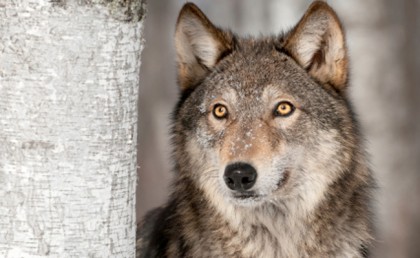
They found that dogs from south-east Asia have a much higher genetic diversity than all other populations of dogs, and relate most directly to grey wolves, and from this they deduced that domestic dogs originated in south-east Asia around 33,000 years ago, beginning with the grey wolf.
"After evolving for several thousand years in east Asia, a subgroup of dogs radiated out of southern East Asia about 15,000 years ago to the Middle East, Africa as well as Europe. One of these out-of-Asia lineages then migrated back to northern China and made a series of admixtures with endemic east Asian lineages," the scientists write.
"Our study, for the first time, reveals the extraordinary journey that the domestic dog has travelled on this planet during the past 33,000 years."
In other words, for all you dog lovers out there, here's the family tree of your pooch: about 33,000 years ago, his distant ancestor, the grey wolf, first made friends with a human. Jumping forward, about 15,000 years ago, a small group of domesticated dogs, descended from grey wolves, left home and headed for the Middle East and Africa. They made it to Europe about 10,000 years ago. And when humans first came to the Americas, they are thought to have brought dogs with them.
With the added twist that it's possible some of the dogs trotted all the way back to China, and began interbreeding there.
And that's how the grey wolf is connected to this cute little terrier.
How did these researchers make these findings?
The Guardian explains: "Because each genome is a text copied (with regular misspellings, or mutations) through the generations, and every genome is related to every other genome, any comparison begins to tell a story of family connections and separations long ago. The more 'texts' that can be compared, the more certain the story they start to tell."
So we still don't know all the fascinating details, like whether your dog's ancestors went out scavenging with hunter-gatherers, or exactly what persuaded him to hang out with the humans, but we do know a lot more about the geography of his ancestry.
Now I wonder if those first domesticated dogs had learned how to bark?
Judy M., Care2, December 21, 2015.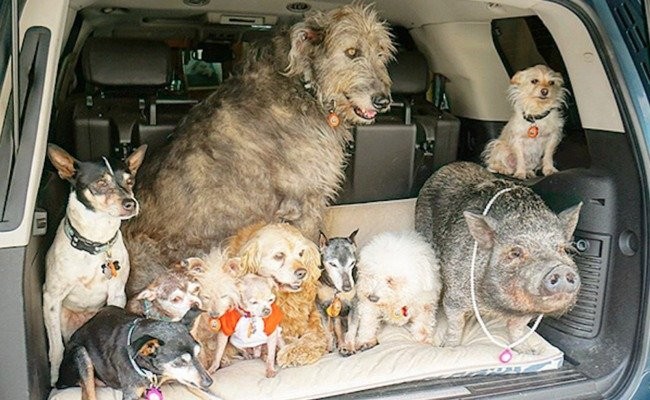
The loss of a beloved dog in 2011 shook animal lover Steve Greig to the core. How he chose to deal with his grief ended up in the best way possible. It says a lot about who he is.
"I was just so distraught about [my dog's death]," Greig told The Dodo. "A month or 2 went by and I still felt so horrible about it. I decided that the only way I would feel better was if something good happened that probably wouldn't have happened if he had not died."
Greig set out to adopt the most unadoptable dog he could find in his hometown of Denver, Colo. He wanted to give a good life to a dog nobody wanted. He found his new friend in little Eeyore.
"So [I adopted] a 12-year-old Chihuahua with a heart murmur and 4 bad knees and I brought him home and that was just the beginning of all the animals."
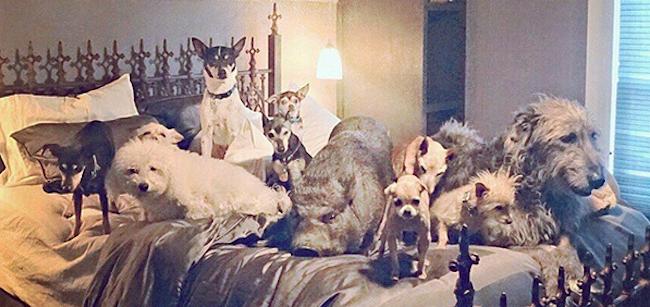
Yes, we need to discuss all those animals. You see, Greig didn't stop with Eeyore. One by one, he brought other dogs "with issues" into his home. Now there are 9 of them in the family. Better still, he didn't stop with saving dogs.
Greig has now given a safe forever home to a pig named Bikini, 2 ducks, 2 chickens, pigeons, 2 cats, a rabbit named Stuart, and a pond full of koi. He got Bikini and the chickens at a farm animal swap. The rabbit showed up in his yard one day, apparently abandoned there by someone who knew Greig took in animals.
Somehow, these animals needed him and he found them. Greig saved their lives and in return, they've changed his for the better.
"When I was younger I never realized you could form a measurable connection with a rabbit, chickens, a pigeon, a pig," Greig said. "But as I got older, I took the time, I allowed those things to happen. My life is better now."
All these animals require a lot of care, so Greig, an accountant, gets up mighty early to take care of everyone. Because they're seniors, the dogs are on a variety of diets and medications. Greig is up with the birds at 5 a.m. to be sure he's got enough time to feed and medicate all his charges.
If you'd like to keep up with Steve Greig and his menagerie of animal friends, just follow him on Instagram. More than 489,000 people already do and it's well worth your time.
Of course, since he's adopted older dogs, eventually nature takes its course and Greig loses another friend. He's found the love he gets from his Instagram followers helps him get through it.
The next time you're looking to bring a new animal friend into your home, consider doing what Steve Greig did. So many loving, loyal senior dogs and cats sit unwanted in animal shelters, simply because they're not youngsters anymore. Yes, they're graying, they move slower than they used to, and they may have some medical issues. None of that will diminish the affection they would show you if you gave them a chance to live out their golden years with you.
Hats off to a good man who chose to do something kind in remembrance of his lost canine buddy. A gaggle of wonderful homeless animals might not be alive today if it weren't for Steve Greig.
Susan Bird, Care2, March 21, 2016.
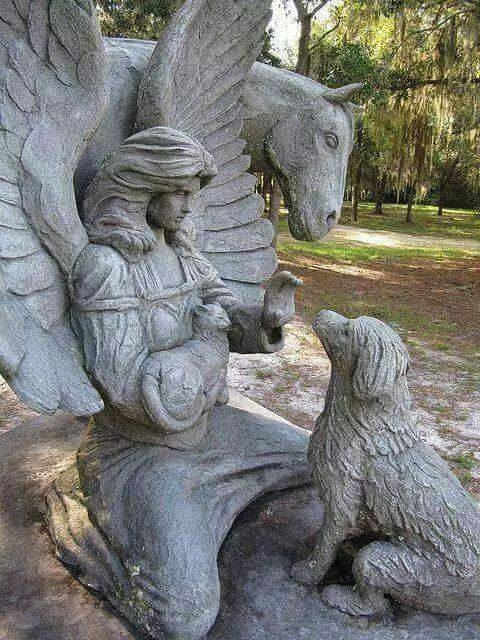
The one absolutely unselfish friend that a man can have in this selfish world, the one that never deserts him, the one that never proves ungrateful or treacherous, is his dog.
A man's dog stands by him in prosperity and in poverty, in health and in sickness. He will sleep on the cold ground where the wintery winds blow, and the snow drives fiercely, if only he may be near his master's side. He will kiss the hand that has no food to offer, he will lick the sores and wounds that come in encounter with the roughness of the world. He guards the sleep of his Pauper master as if he were a prince.
When all other friends desert, he remains. When riches take wings and reputation falls to pieces, he is as constant in his love as the sun in it's journey through the heavens. If misfortune drives the master forth an outcast in the world, friendless and homeless, the faithful dog asks no higher privilege than that of accompanying him to guard against danger, to fight against his enemies.
And when the last scene of all comes, and death takes the master in it's embrace, and his body is laid away in the cold ground, no matter if all other friends pursue their way, there by the graveside will the noble dog be found, his head between his paws, his eyes sad, but open in alert watchfulness, faithful and true, even in death.
 How to love your dog.
How to love your dog.
 How Dogs Can Help with Mental Health - Mind Boosting Benefits of Dog Ownership.
How Dogs Can Help with Mental Health - Mind Boosting Benefits of Dog Ownership.
 Dog Story - How did the dog become our master?
Dog Story - How did the dog become our master?

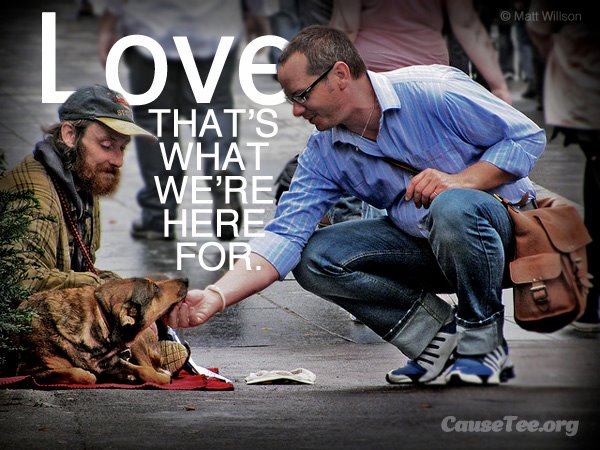

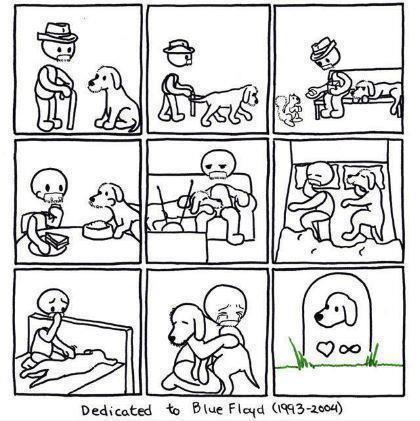
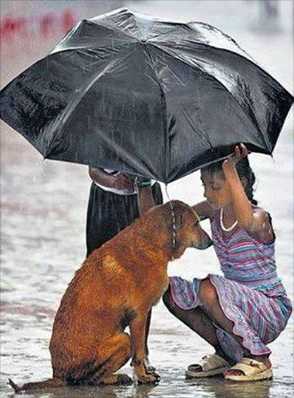
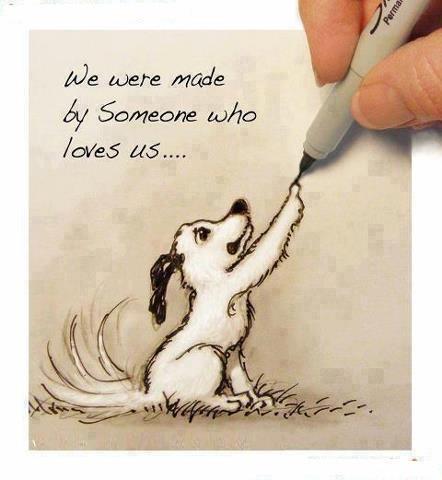
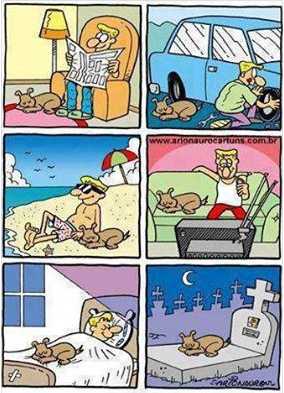
"Dogs are not our whole lives, but they make our lives whole."
Roger Carras
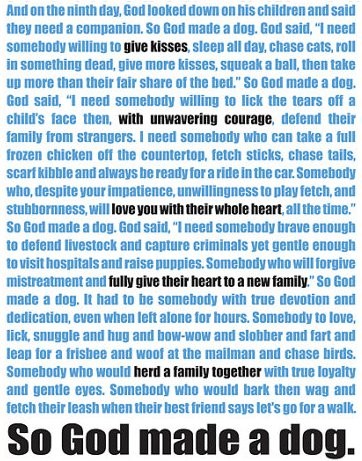
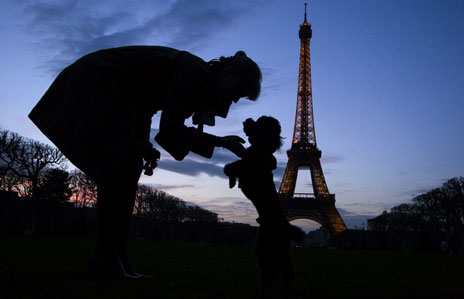
 Back to my home page
Back to my home page
